So I was reading this article about how Berlin has changed and, as I read it, something about the old, pre-cool Berlin that the writer describes felt familiar.
I can't point to any one quote that captured this for me, just an overall feeling - a modern, capitalist, free city (well, half-free) that was not particularly inviting to outsiders, was off the beaten track, and was full of grubby neighborhoods that you could live in if you wanted cheap rent. If you were there it was because you wanted to be there, and not anywhere else, but anyone who wanted to be anywhere else generally did not give Berlin a second look. The "beautiful people" were in other cities (London, Paris, Milan).
And I realized, it reminded me of Taipei now. Taipei is not particularly cool. It doesn't have the cachet with Westerners that Shanghai, Beijing, Hong Kong or Tokyo (or more recently, Seoul) do, or even Bangkok or Singapore. Tourists from other parts of Asia come here but it is not a global tourist hotspot by any standard, and wasn't a tourist hotspot at all until Chinese tourism opened up. You are here because you want to be here - at least I am here for that reason - and not anywhere else. It's very local, and looming just across the straight is a massive Communist threat. I highly doubt Chinese missiles are going to rain down on my head anytime soon, but some days you can't help but wonder and be reminded of that during the occasional air raid drills. The beautiful people are in those other cities, and with them their beautiful overpriced nightspots and commercialized bar and restaurant scenes.
It can be nice and shiny and new - look at Xinyi (or don't - I kind of prefer not to). But entire neighborhoods are a bit grubby, and you have to look more deeply to find their charms (which they do have). It's so cool because it's not cool at all.
And, like that older version of Berlin, you have to work to understand it, and you might not always like it at first. You may remember that I did not really like Taipei when I first arrived. It was hard - foreigners generally make friends with coworkers when they first land but I didn't care for most of mine (the ones I liked I still didn't feel that close to, and they have pretty much all since left Taiwan). I cried on my birthday, after eating dinner alone at a terrible Indian restaurant, two weeks after arriving, on the Muzha line MRT because I could look down through rain-streaked windows at people on the street all going somewhere they belonged and probably seeing people who cared about them in lives that were anchored in some way, and I had none of those things. It took another year or so before I felt like Taipei was alright, and probably another year after that before I began to really feel it, and Taiwan, was someplace special.
As an aside, so far I can count on one hand the number of people who know why this blog is called Lao Ren Cha. There is no special reason why I don't publish the reason publicly other than I never really felt like it. The people who know I felt, for whatever reasons I had at the time, deserved to know. Some still do! But, it's not a big deep secret, and perhaps someday I will write about that. What I'll say now is that it was very much intentional - not just a pretty name - and is very much directly related to my experiencing Taipei first in a muddy, dark, monochromatic sepia and only later a stunning, clear azure blue. It took more time than you would ever think such a thing would require.
And I'm not alone - when my cousin visited recently and stayed for a semester, he took time to adjust too. At first absorbing everything, then feeling a bit down due to the unrelentingly bad weather, then finally realizing one day that he had a solid group of friends and that Taipei was a super cool city to be in. The Taipei effect is not immediate.
I do wonder, as Taipei gets cooler - maybe not Seoul-level cooler but cooler nonetheless, with its plethora of perfect little cafes and increasing number of tour buses, increasing rents and gentrifying neighborhoods if it will start to become a victim of its own coolness. Part of me hopes it will bypass the Brooklyn effect, as it feels like it's already become too expensive to truly be a hip haven - and all the cool kids are already taking advantage of the better weather and cheaper rents in Tainan.
I wonder, I guess, if in 10 years (assuming I am still here, which I may be), what was an off-the-beaten track choice for building a life in Asia will start to be THE place to be and it will start to lose some of its street-level vibrancy and slightly grubby charm. Will I feel like that disaffected old expat in 10 years, complaining about all the new kids and how "this city isn't what it used to be"?
Yes, I do realize expats before me have already said that, but I wasn't here then so LA LA LA I CAN'T HEAR YOU.
Part of me wants Taipei to get that international recognition. Part of me wants it to stay the way it is.
Showing posts with label living_in_taipei. Show all posts
Showing posts with label living_in_taipei. Show all posts
Wednesday, May 25, 2016
Monday, May 9, 2016
Something Old, Something New
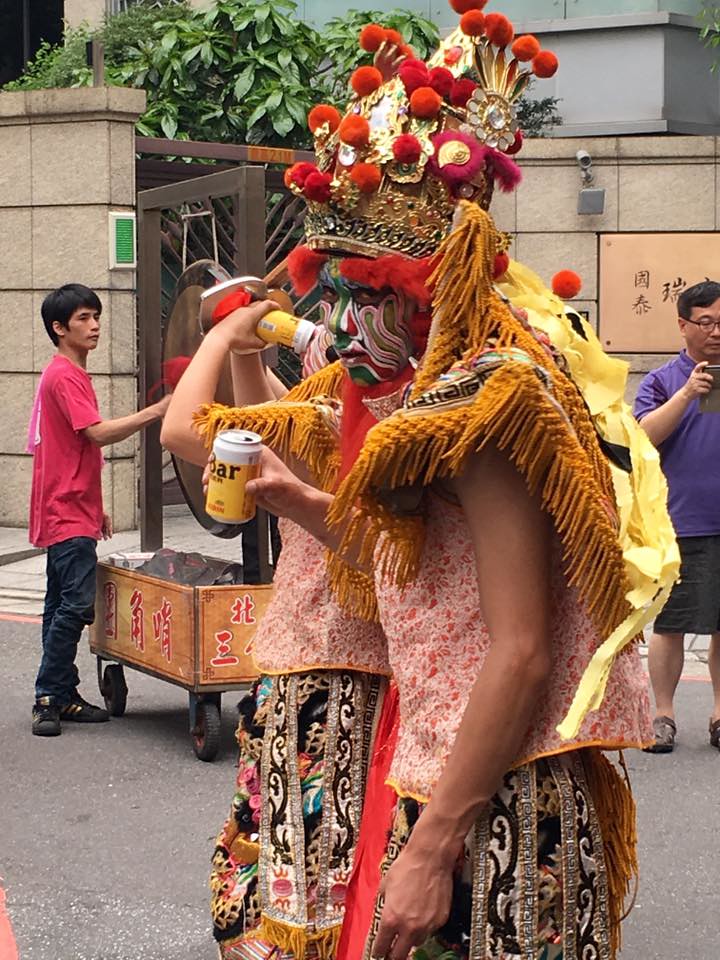
One of the things I love about living in Taiwan - though I suppose this is true for expat life in just about any country - is that I can see something that looks as though it will be the same as something I've seen in the past, but discover something completely new within it.
For example, I happened upon a temple parade in my neighborhood a few weeks ago. It is fairly rare to find one there; they usually take place in the older part of the city, not the most densely populated part of Da'an! I enjoyed it in part because, being more of a neighborhood thing, it didn't draw the massive crowds that the more well-known festivals draw. I was able to get solid close-ups of the temple cohorts and performers, including some more unique or characterful shots that are hard to get when you are pressed in by a massive crowd at, say, Qingshan Wang, Baosheng Culture Festival, the Matsu pilgrimage or others.
The other thing I liked about this festival was that I saw something I'd never seen before, despite having thought I'd "seen it all" as far as temple parades go.
And that is the offering of beer to bajiajiang, or the 8 generals!
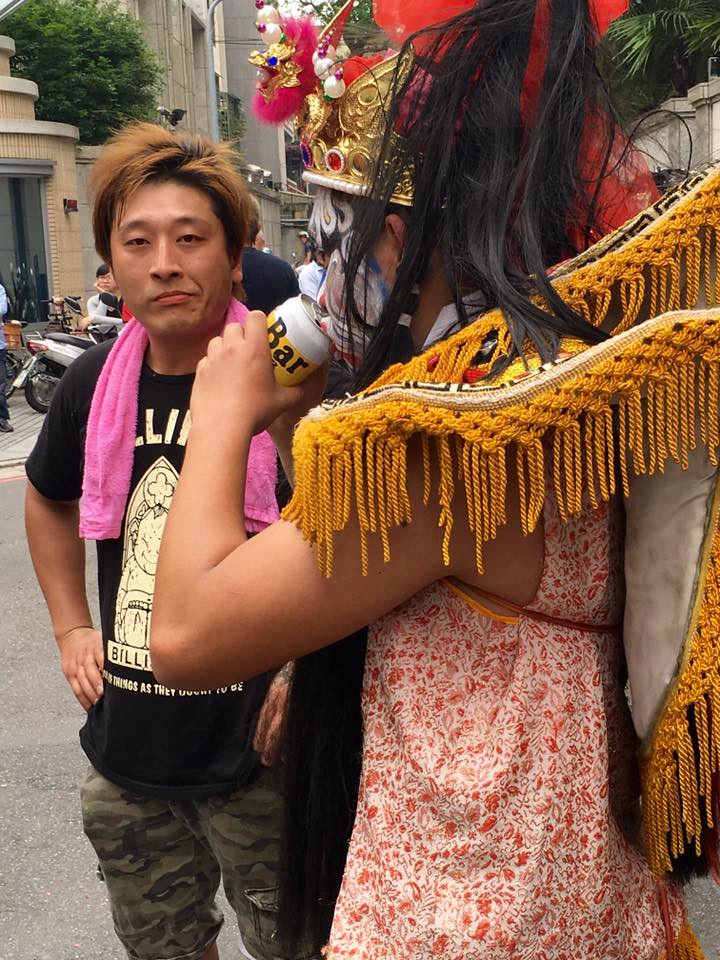
This was really interesting to watch - a tiny temple, more like a shrine, in the lanes around Rui'an Street, coming out with a tray of Bar Beer and offering it to the performers. The performers accepted it formally and drank it quickly.
I didn't know this was something you could do, in fact, I wasn't aware they could be seen drinking, talking or using technology (though I have definitely seen bajiajiang chatting, smoking or on cell phones when they shouldn't be.
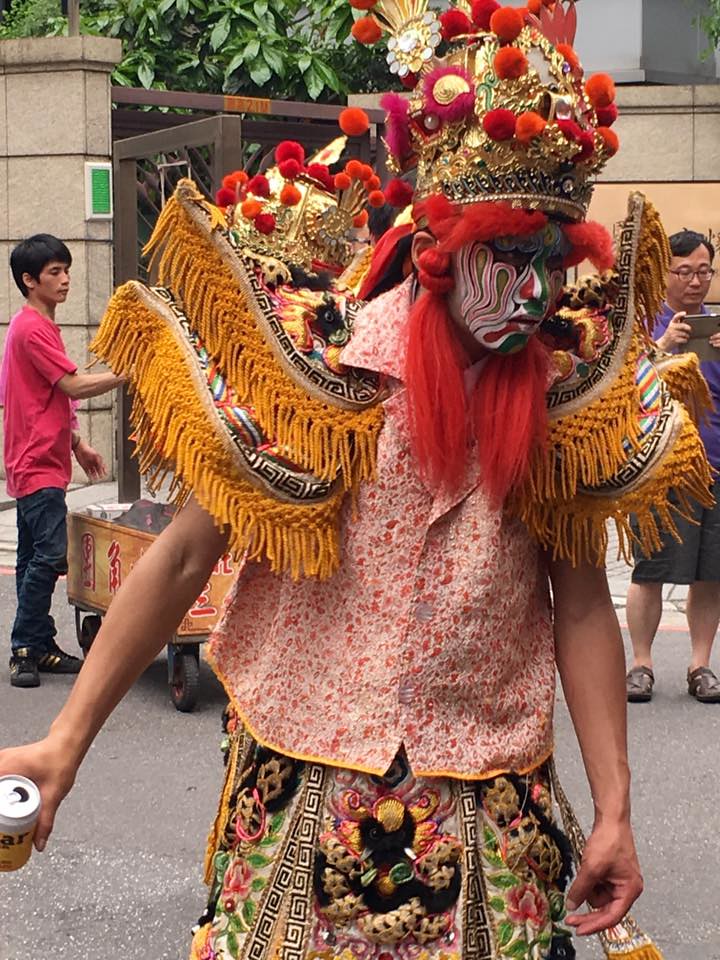
Another thing I didn't expect was the "temple parade enthusiast" (which I joked might be me in about 30 years) - I had seen spirit medium type parade followers who became possessed during parades but never one who was clearly not possessed but simply wanted to also be a part of the procession. She even had the right outfit, and was allowed to join by the rest of the temple troupes.
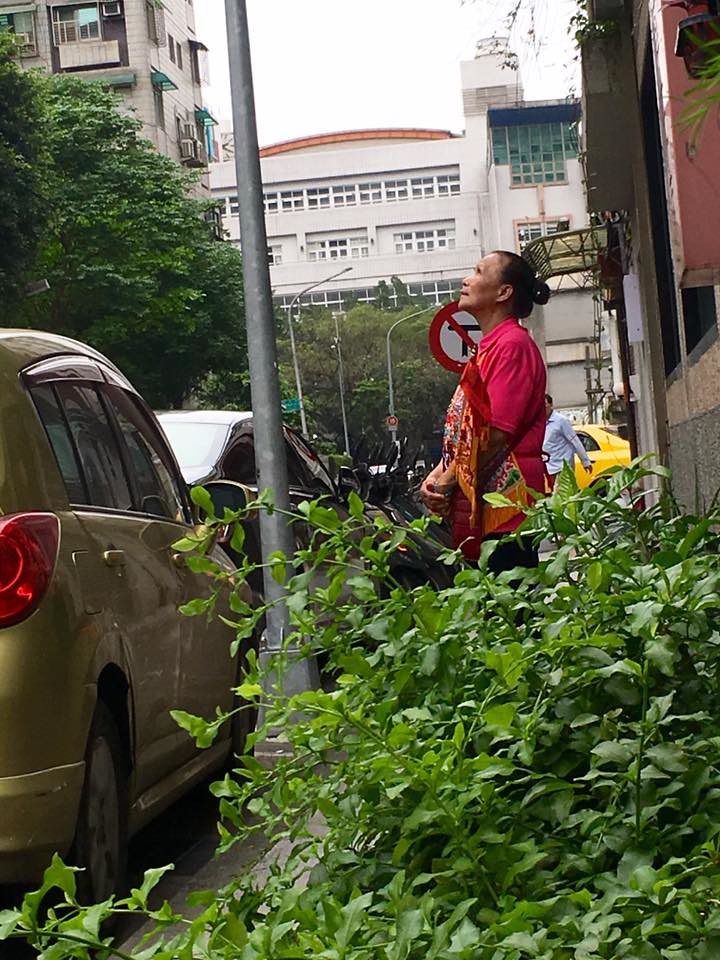
I was quite sad to see a truck with poles for sexy temple dancers being used for Three Princes (santaizi) instead, and none of them were dancing on the poles. A pole-dancing child god would be a wonderful photo!
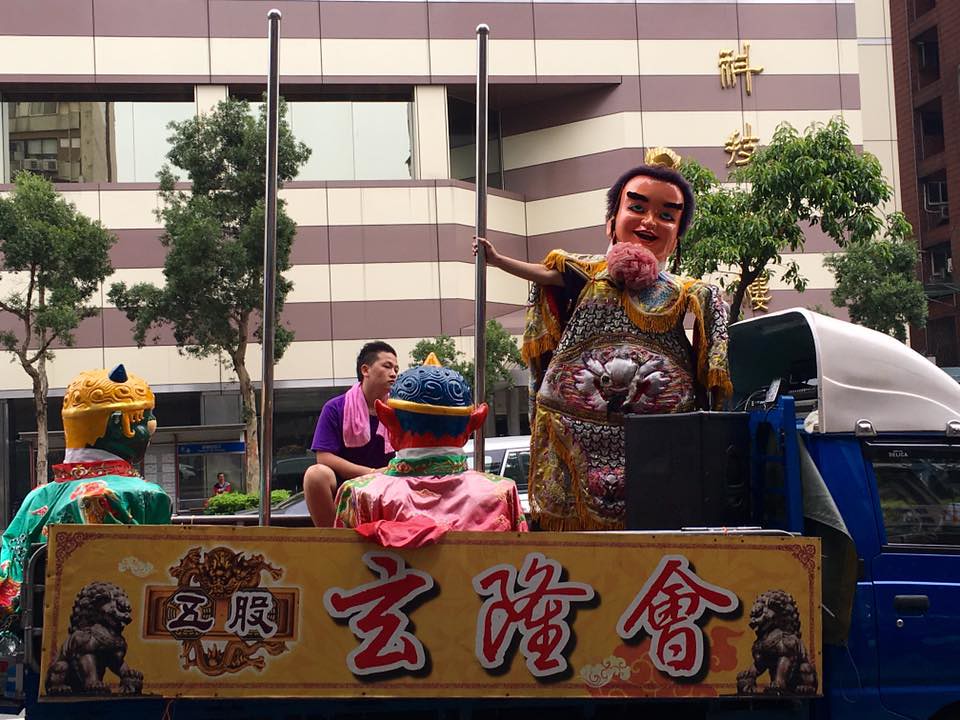
Otherwise it was a fairly normal neighborhood parade, with small crowds coming out to watch, not unlike, say, a Firemen's Day parade in the US but more colorful and interesting, at least to me. There were two bajiajiang troupes, the second fiercer than the first. These guys were legit scary:
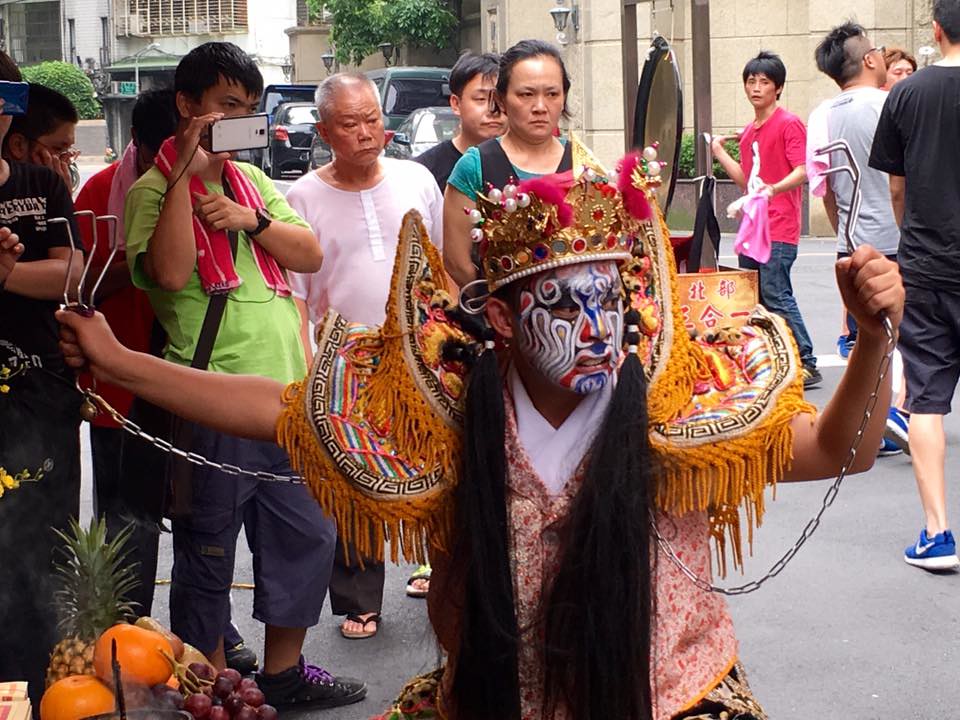
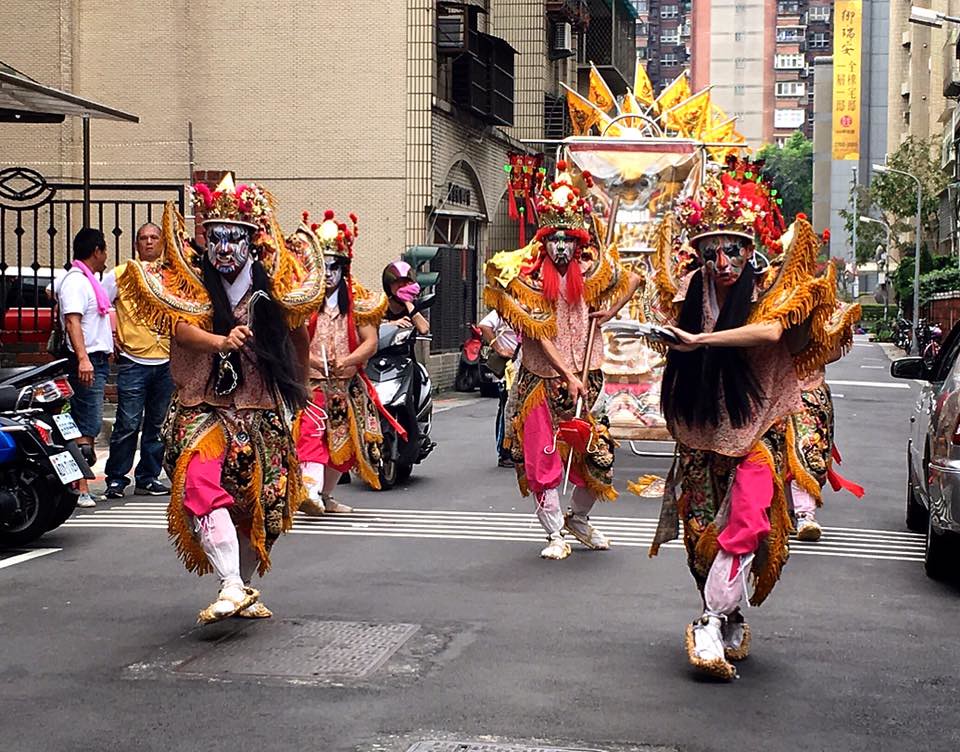
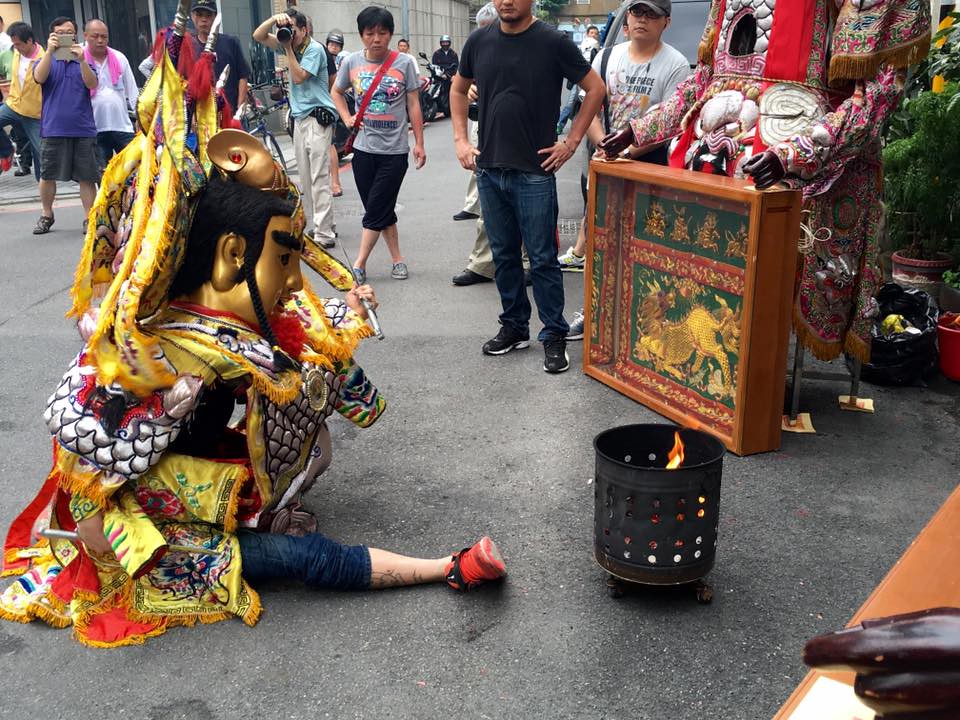
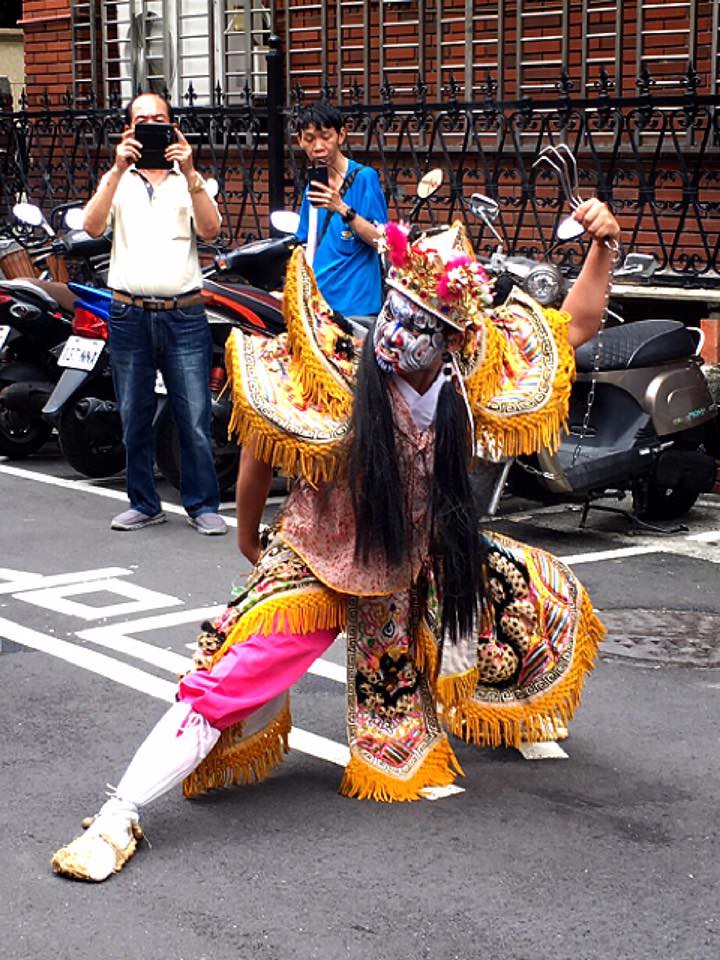
And the usual cohort of dragon dancers, lion dancers and tall god costumes.
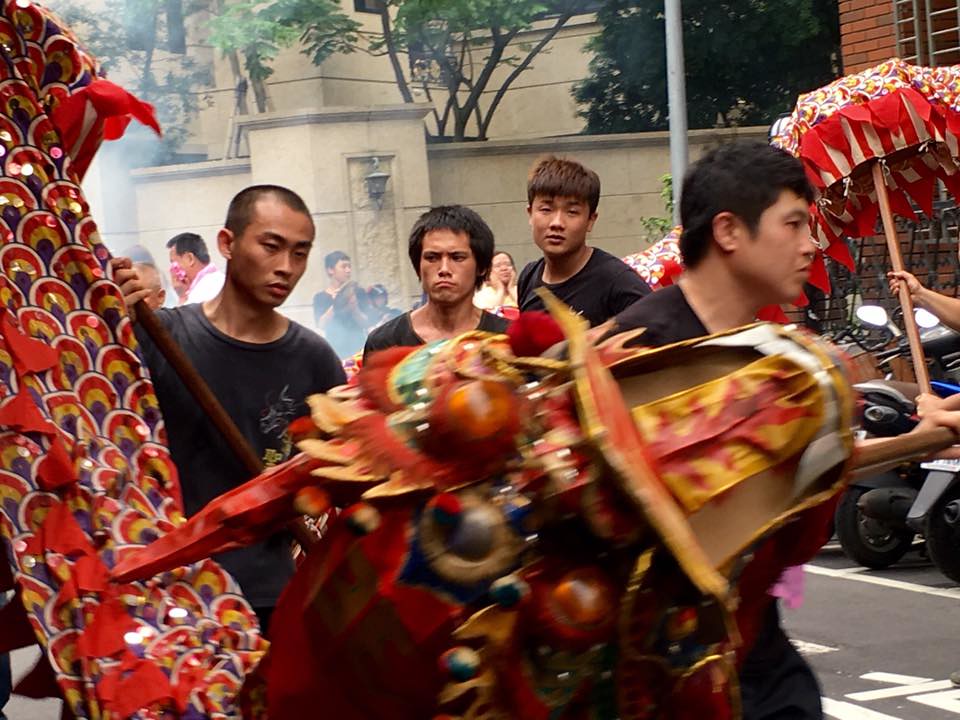
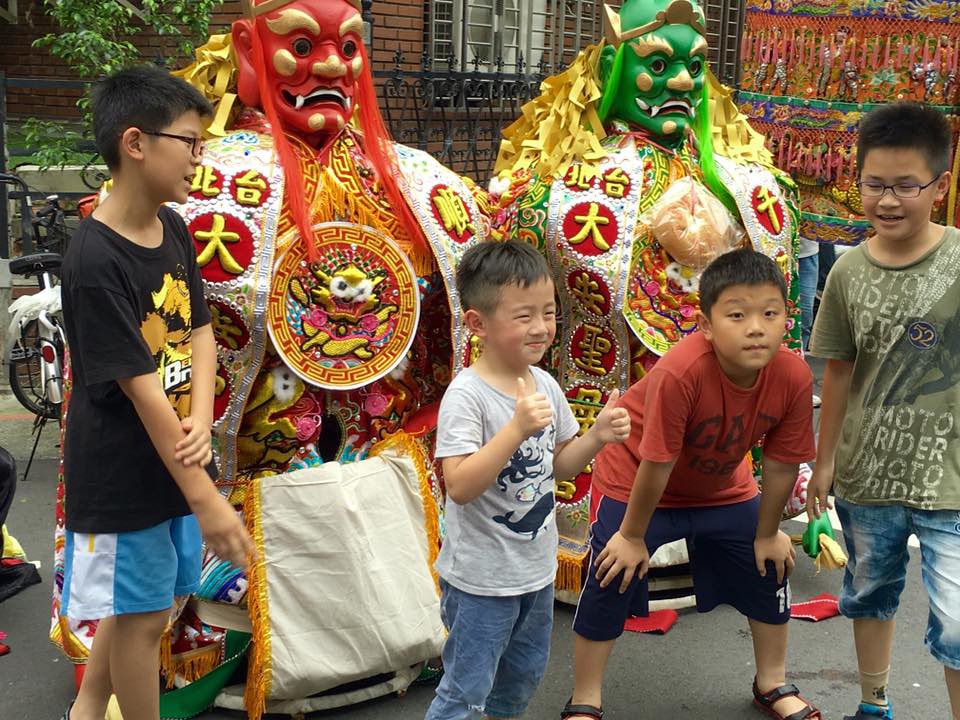
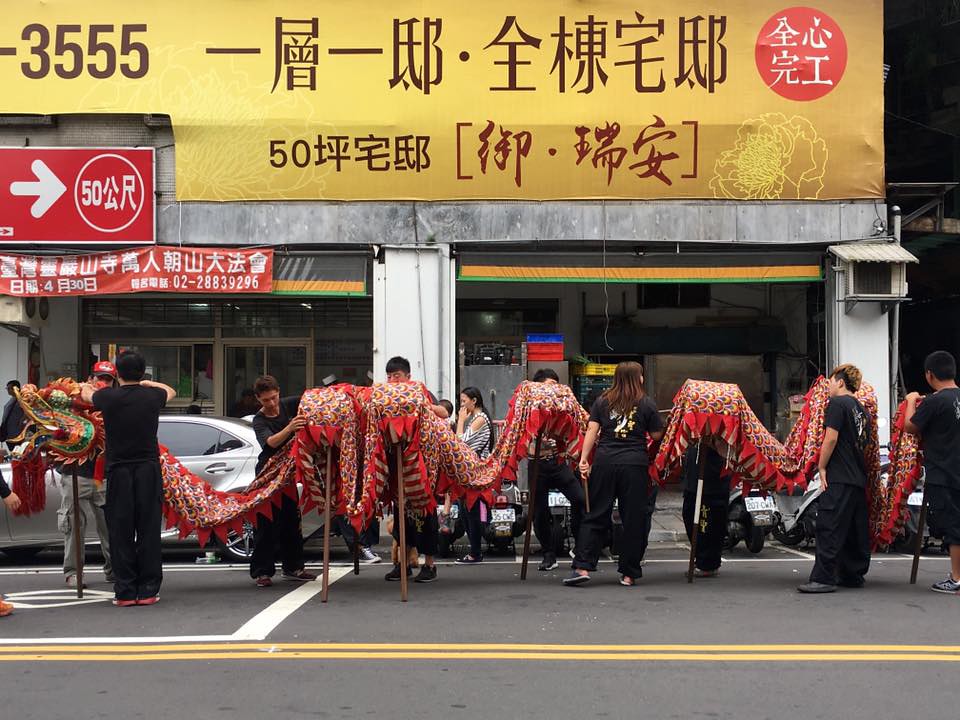
What bothers me, and I feel like writing about here, are complaints about traditional temple activities and how they should be curtailed or banned. Not just temple parades but ghost money, Mid-Autumn Festival barbecue and Chinese New Year firecrackers.
People complain that they are noisy, they are dangerous, they pollute, they annoy neighbors. I have very little patience for this (maybe for the ghost money but honestly the most polluted days to me are not the ones on which it is being burned). People who think the occasional temple parade causes "pollution" don't seem overly concerned about the actual biggest source of noise and air pollution in Taipei - scooters. Or how they are far more dangerous than a few fireworks from a parade.
They say Mid-Autumn Festival BBQ annoys neighbors, without even thinking about how noise trucks, those stupid loudspeakers outside of stores, or community events (Fireman's Day is a big one in my community, and there are quite a few concerts and children's events too) that are just as noisy and maybe just as annoying to some of us. But no, a few days of barbecue is somehow more polluting than Taipei's traffic, and somehow noisier and more annoying than all the other events in the city.
Give me a damn break. I just can't take seriously the idea that temple parades are somehow worse than scooters for traffic snarls, noise, air pollution or general danger and public annoyance, that Mid-Autumn BBQ is worse than a political noise truck or more polluting than the imprint of a large, air-conditioned, concrete department store, that Chinese New Year fireworks are more annoying than the Musical China Douchemobile. That ghost money smoke creates more pollution than factory or traffic exhaust (again, the worst pollution days to me - someone with a weak respiratory system - are actually not ghost money days).
So stupid. So wrongheaded.
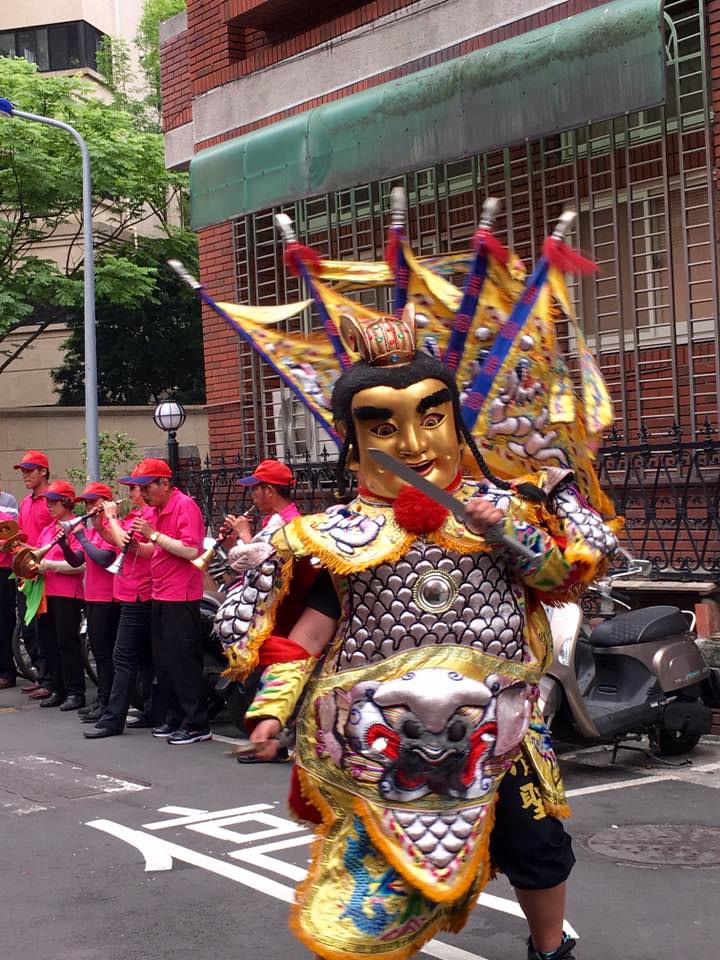
I'm usually not one go to in for conspiracy theories, but I can't help but wonder in whose interest it is to slowly let the air out of the cultural street life of Taipei (and Taiwan in general, but this seems to mostly be a Taipei problem). Whom does it benefit to see temple parades become smaller, quieter and more rare until they disappear altogether? Whom does it benefit to squash autumn barbecues? Whom does it benefit to allow noise trucks and civic events but not firecrackers? Whom does it benefit to ban or discourage election posters so Taipei looks less like a democracy going through an election as you drive around?
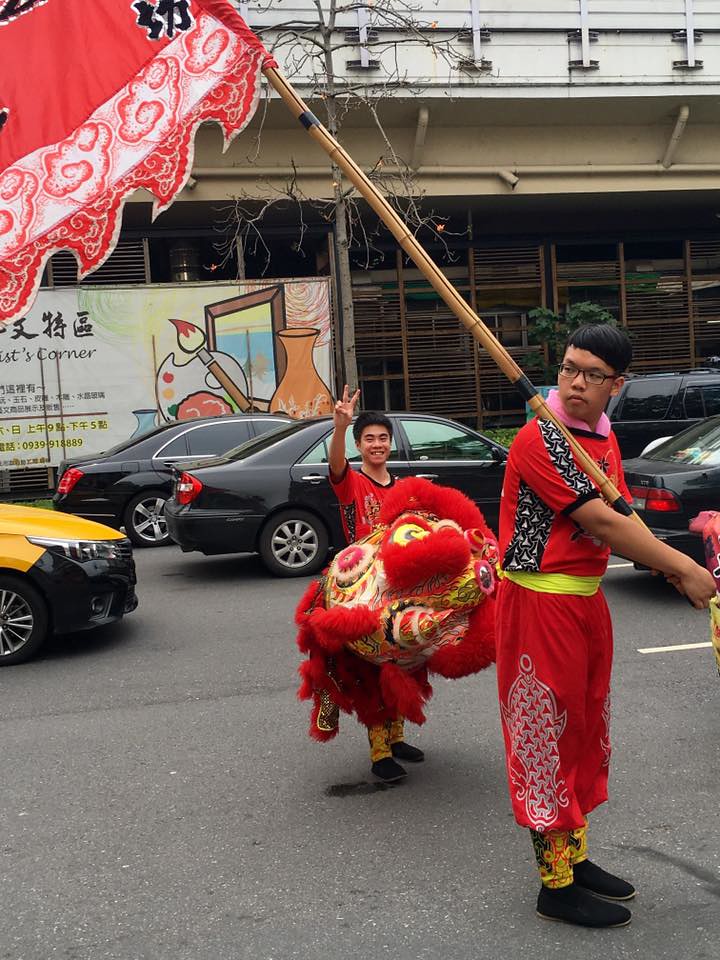
Because it seems to me that while temple parades may have originated in China, they aren't really done much in China anymore (one year in China and I saw exactly one lion dancer, hired for the grand opening of a supermarket), and a lot of the quintessentially "Taiwanese" practices, such as bajiajiang, have their origins in a few temples in Fujian and aren't really pan-Chinese in any real sense of the word. I didn't see much ghost money burning in China either although it originated there and I am sure is still practiced to some extent. The others, such as barbecue (which originated in Taiwan with a barbecue sauce ad, but I still love it and anyone who doesn't can shove off) and, well, democracy, are not Chinese in origin at all. Night markets may be a thing in some parts of China - I went to an okay one in Yantai - but most people associate them with Taiwan...and a lot of neighborhoods have become recently and mysteriously interested in closing down night markets in their vicinity where no such animosity existed before.
Is it an attempt, consciously or not, to make Taiwan look more like China?
I don't know, and I realize I'm baiting conspiracy theory by even asking, but that's sure how it feels.
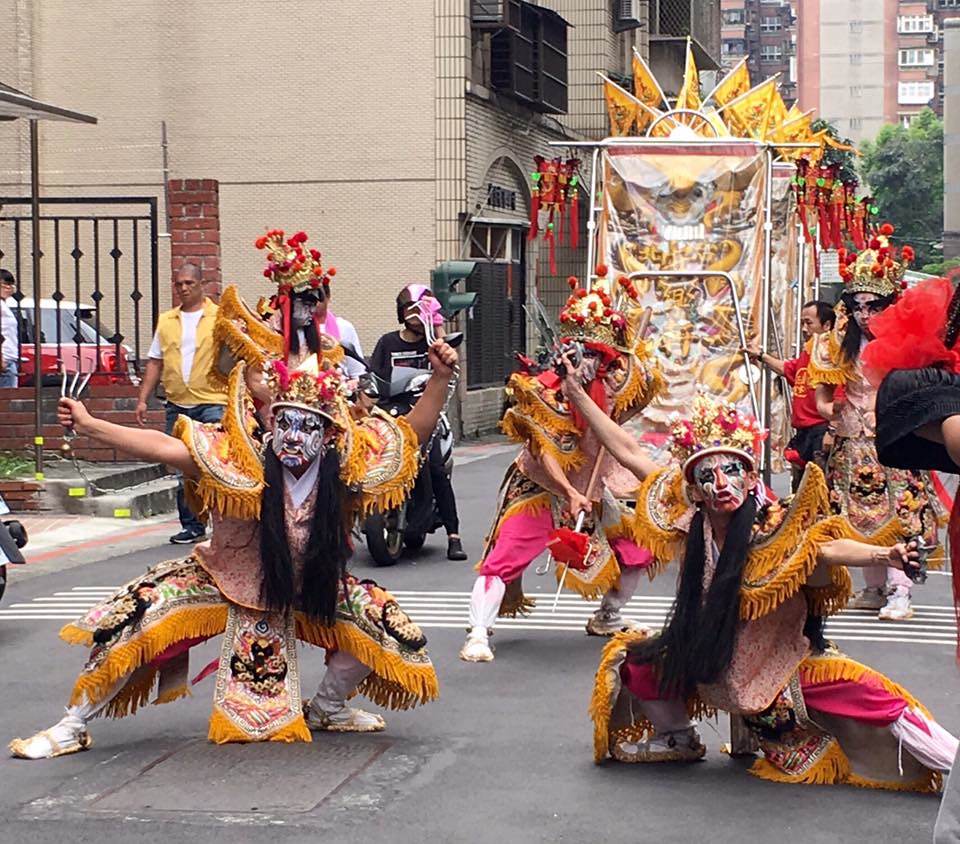
Some people, for sure, probably aren't even thinking along those lines and think these are the things keeping Taipei from being a truly modern city - quiet, clean and upscale.
Which is of course utter nonsense.
These things are what make Taipei Taipei, rather than, I dunno, some crappy box-building city in China with streaky luxury apartment complexes rotting out by the 80th ring road, or Beijing which is even worse than that despite the cultural heritage because you literally can't breath and they are slowly razing anything of interest (rather like the cultural razing of temple parades and other items of cultural interest in Taipei in favor of luxury apartments, boring civic celebrations and department stores?), or Duluth or Peoria or Des Moines or some other city I wouldn't want to live in that feels like a stand-in for a boring, poorly-planned metropolis more known for suburbs than actual urban vibrancy.
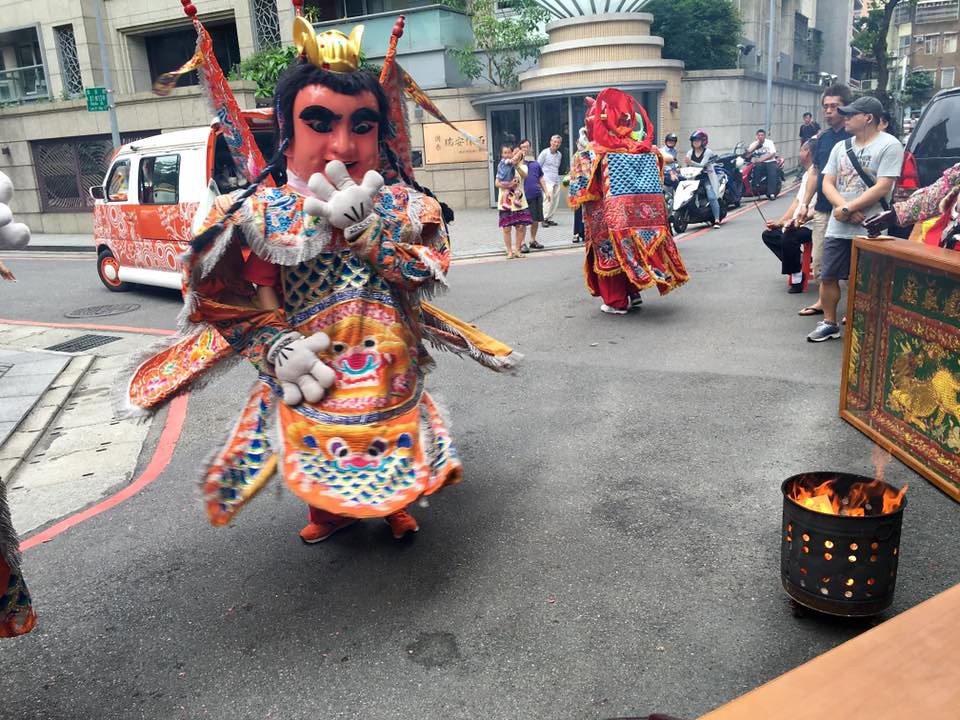
I mean, if I wanted to live in Duluth I would have moved to Duluth. If I wanted to live in 屁眼, China, I would have moved there.
I live in Taipei because I want to be in Taipei, and a part of that is the street life, the overall street-level liveliness, and the cultural aspects of living here. I'll put up with a traffic jam because a ten-foot god is walking down the road for that.
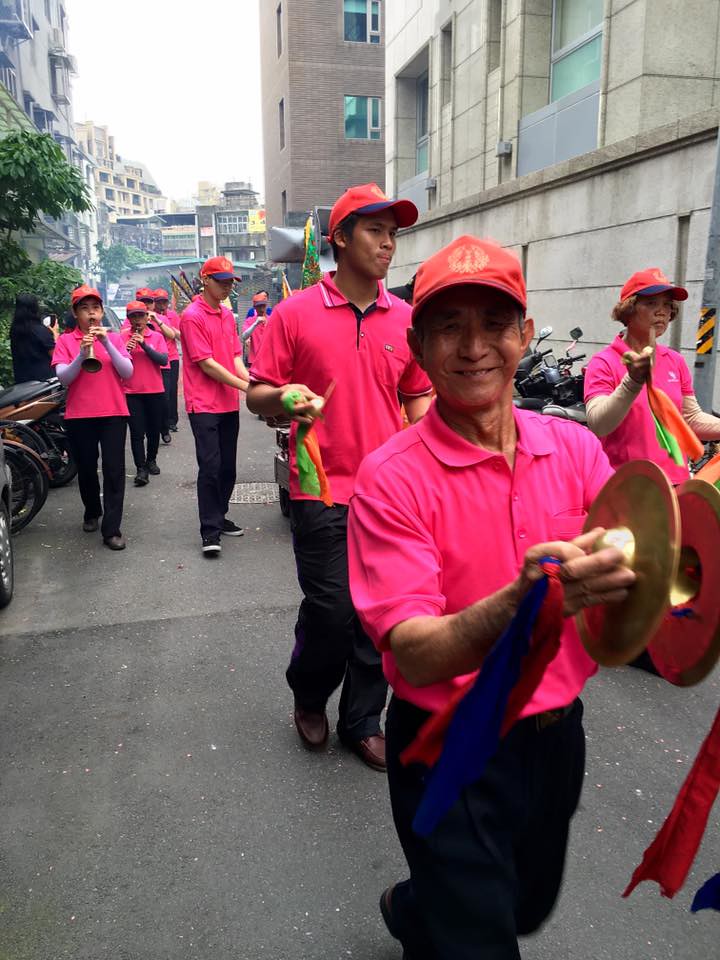
Some people do say it's because so many temple events are connected with gangsters, because gangs, temples, businessmen and politicians are in many ways just an inbred group of cronies in Taiwan.
Sure, that's true.
But who cares?
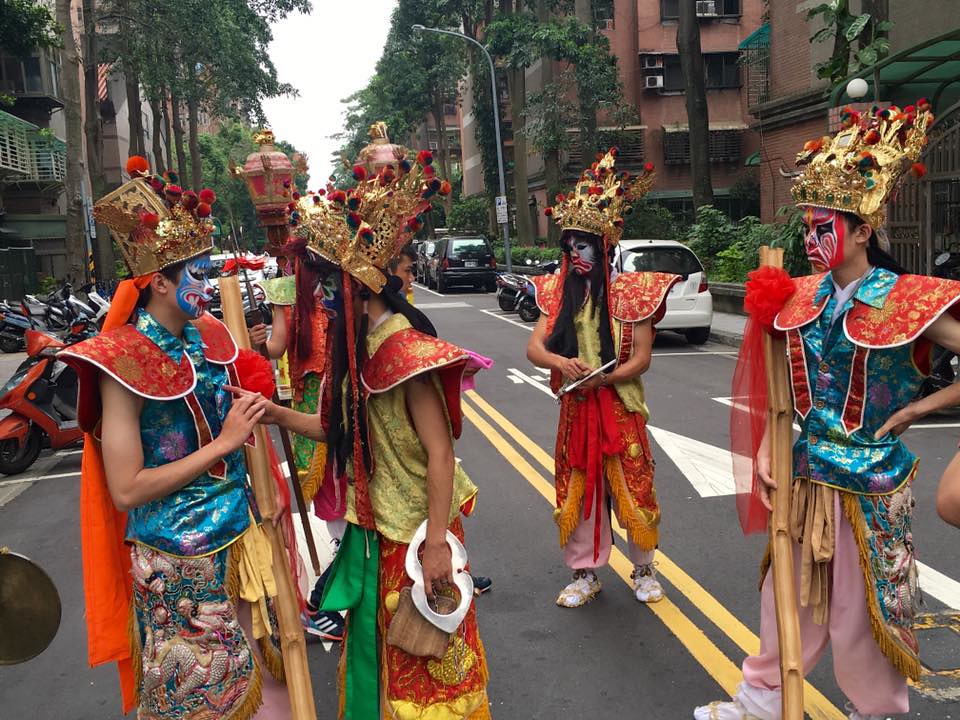
Honestly, of all the things gangs in Taiwan are involved in, this is by a very wide margin the least problematic. Stopping temple parades isn't going to make gangs go away, and even if there is gang activity inherent in them, it's fairly harmless as gang activity goes.
I mean, imagine if the best pasta joint in town were run by the local mafia (which in New York might very well be the case, though not always). Would you want to stop the gang from doing anything illegal or truly problematic? Sure.
Does that mean the pasta restaurant is the problem, and you shouldn't enjoy delicious pasta there? I don't think so. It just doesn't seem like a very strong reason to me. You want to crack down on gangs, crack down on scammers, prostitution rings/pimps/brothels, drug cartels and a scary large percentage of politicians and big business.
The temple parades are not the problem.
Anyway, rant over, enjoy a few more photos:
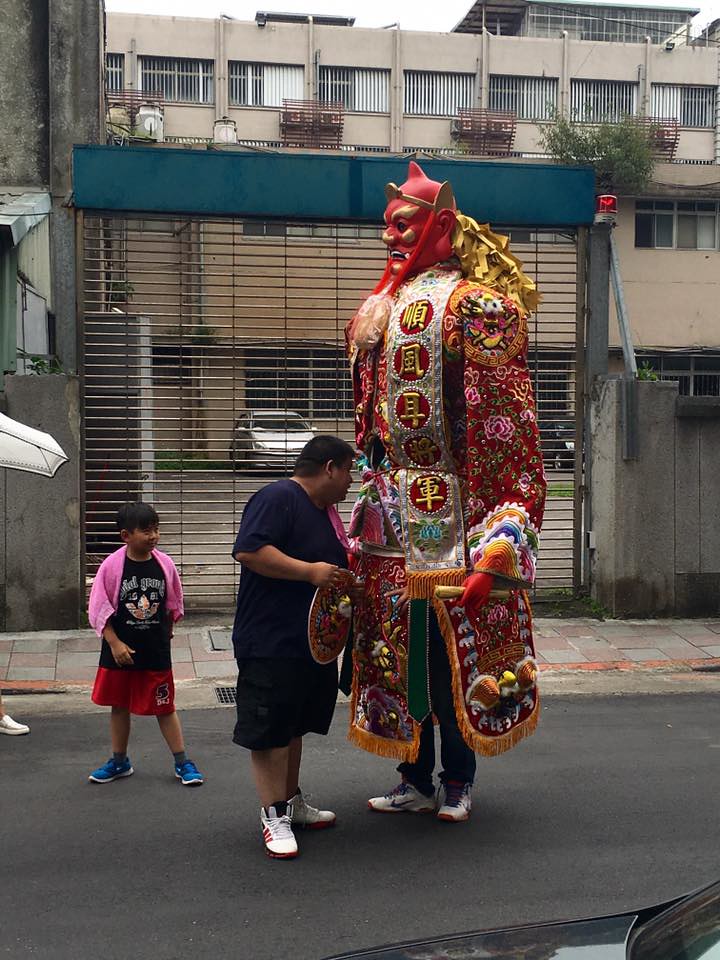
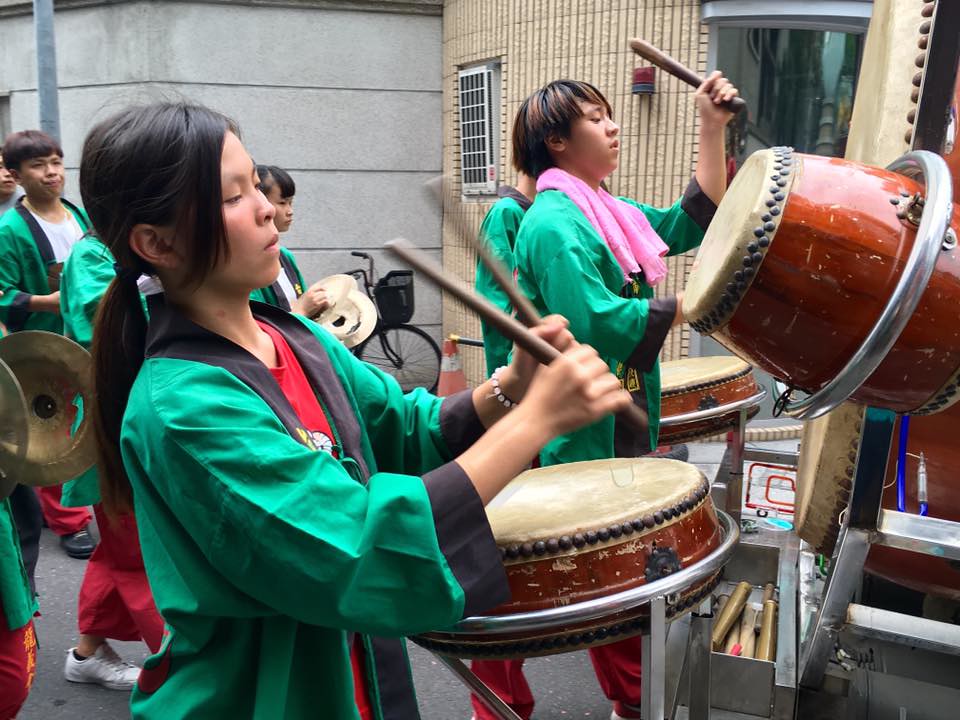
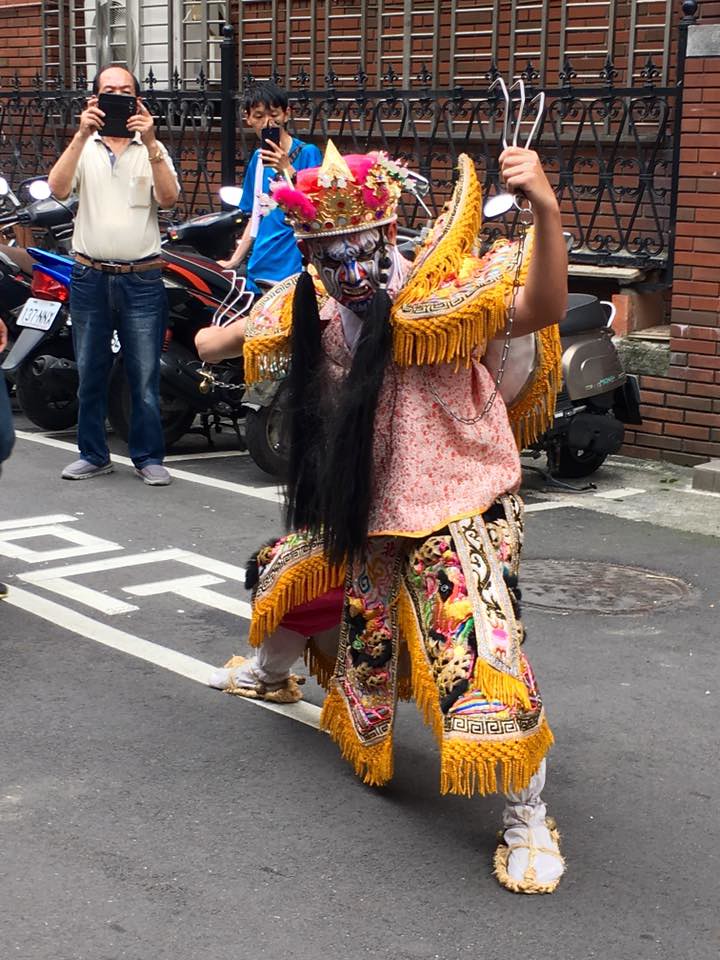
Thursday, December 17, 2015
I'll Actually Be Home For Christmas
| Stockings hanging on the fireplace at my parents' house |
Several years on, a follow-up to an older post of mine about not feeling the holiday spirit in Taipei.
Out of habit, I refer to the USA as "home" and Taiwan as...well, as the place I live, I guess. But I've realized recently that referring to these two places in such ways is disingenuous. I used to think that 'being home for Christmas' meant being in the USA, and staying in Taiwan meant 'not going home for Christmas'.
But as much as there are forces keeping me from fully embracing this country as "home", namely because this country in many ways doesn't necessarily want me to call it home, I've realized that too is incorrect.
This Christmas I'll be in our apartment, with my husband and my sister, opening gifts under our tree, and unstuffing my stocking. These things are mine. Brendan is my primary family. I don't live in a house in upstate New York, or even an apartment in Washington DC or anywhere else: I live in an apartment in Taipei, and we are a little family of two with a sibling close by and two cats.
How is that not 'home'? And therefore, how can I say I won't be going 'home for Christmas'? I already am home.
Granted, Taipei isn't the most Christmassy of cities, though I do feel there has been a bit more decoration and music (most of it bad, to be honest - "Joy to the World" was never meant to be a polka) than in previous years, and the cold snap means it really does feel something like winter. It is hard to get into the Christmas spirit still because despite all of those trappings, locals don't celebrate it and everyone else will be going to work as usual on the 25th (although I am not religious, I insist on keeping one little island of Western culture firmly set in the stream of my life - I do not work on Christmas), but regardless, I am spending Christmas at home.
It may not be my home forever - in fact it likely won't be for reasons I've posted about before. But it's my home now. I'm not traveling for Christmas, but I will be home.
Labels:
christmas,
expat_life,
holidays,
living_in_taipei
Tuesday, December 1, 2015
Ready, Set, Go
Edited to add: I forgot to include a link to the song that underscored this post. Here you go.
They keep us at sea level so I'm stayin' on my A-game
They're local like the C when I'm express like the A Train.
I had wanted to get back into blogging smoothly, with a few softball posts about traveling in Kinmen and the East Rift Valley before yet another family emergency (this one turned out OK though) sent me back to the US for a good portion of the summer and Delta Module 2 began.
But this article in the Straits Times caught my eye - I do think it's worth a quick reaction post with some thoughts on racism and the ghettoization of foreigners in Taiwan.
I don't feel, up to now, that I have been limited in my career by living in Taiwan - if anything Taiwan helped me launch my career. But, I say that as a career English teacher: of course it would be easier for me than for a foreigner in literally any other field. With the exception of a few really bad years toward the end of my time at my former employer, after they treated my husband like dirt but I stuck around just to get an APRC (and had to pretend just to get through each day that I didn't think what they did was so heinous - when it was heinous, and unforgivable), I've generally had positive working experiences. I have been able to move on to freelance with two very good schools that, while they may technically be buxibans, are places that actually prioritize education and look after their people. I've been able to get a Delta - at least I am basically sure I passed and will have that baby in my hands soon. English teachers can do that. Nobody else, save perhaps an editor or journalist, can.
However, I have to basically agree with this:
They keep us at sea level so I'm stayin' on my A-game
They're local like the C when I'm express like the A Train.
I had wanted to get back into blogging smoothly, with a few softball posts about traveling in Kinmen and the East Rift Valley before yet another family emergency (this one turned out OK though) sent me back to the US for a good portion of the summer and Delta Module 2 began.
But this article in the Straits Times caught my eye - I do think it's worth a quick reaction post with some thoughts on racism and the ghettoization of foreigners in Taiwan.
I don't feel, up to now, that I have been limited in my career by living in Taiwan - if anything Taiwan helped me launch my career. But, I say that as a career English teacher: of course it would be easier for me than for a foreigner in literally any other field. With the exception of a few really bad years toward the end of my time at my former employer, after they treated my husband like dirt but I stuck around just to get an APRC (and had to pretend just to get through each day that I didn't think what they did was so heinous - when it was heinous, and unforgivable), I've generally had positive working experiences. I have been able to move on to freelance with two very good schools that, while they may technically be buxibans, are places that actually prioritize education and look after their people. I've been able to get a Delta - at least I am basically sure I passed and will have that baby in my hands soon. English teachers can do that. Nobody else, save perhaps an editor or journalist, can.
However, I have to basically agree with this:
The challenges that Caucasians face are more in the form of being "ghettoised", said Mr Michael Turton, 52, an American who has lived in Taiwan for two decades.
"Everyone is very polite to us, but try finding a permanent position in a university or business in one's own skill," said Mr Turton, who teaches English at a local university and said he knows of only two Caucasian deans among Taiwan's numerous universities. "Tension is ameliorated because everyone knows foreigners have no power."
One reason is, unlike Singapore or Hong Kong, Taiwan is not a regional financial hub that would have as many job opportunities.
Language is another barrier.
That said, Taiwanese women do tend to find Caucasians to be desirable matches, said Mr Turton, who is married to a Taiwanese woman. They have two children.
"How many local girls want to marry foreigners? Lots. That is because foreigners are an escape fantasy," Mr Turton said, referring to familial obligations women married to local men have to fulfil, and a perception of a better life in a Western country.
First of all, I feel that Taiwan has been a really great place to live this past decade. Up through getting my Delta it's also a nearly ideal place to work. While salaries are stagnant, generally speaking the pay is better than in much of the rest of the world and the lifestyle makes up for the fact that we really all should be earning more. Locals included. Flexible work allowed me to get that Delta while doing three modular courses. Taiwan is relatively well-connected to the outside world so I was able to access books I needed for my coursework. I've been able to travel a lot because of affordable airfares to the rest of Asia.
However, I have to say I've started noticing cracks in the facade of our great lifestyle here.
First, I know someday I will get a Master's - the issue is paying for it, not the actual work. I was born in a country where higher education is prohibitively expensive, I can't just say "Imma go to grad school!" the way Canadians, Australians and Europeans (and many Taiwanese) do. Once I do, I have to admit that I see the end of the line. At that point will I really want to be working in private language schools, as good as my two current employers are? Probably not, to be honest. But what else can I do? International schools aren't ideal (plus I'd also have to get a teaching license most likely) as I don't particularly want to teach teenagers full-time. Universities simply don't pay well enough (salaries are in the range of NT$60,000/month I've been told, and frankly, that's not enough even with paid vacation). But we foreigners really are limited in terms of moving up if we actually want to teach. There are a handful of schools that hire foreigners as academic managers or teacher trainers, and those positions don't always pay particularly well either (plus your job is often to be the 'bearer of bad news' between the teaching staff and Taiwanese upper management if it's a locally-owned school, which sounds like my idea of hell). The schools I work for don't do this, but a LOT of schools see foreigners as foreign monkeys to put in classrooms to get students in, and just take for granted that they should never be anything more. So, when that time comes and I'm ready to move up in my career...where exactly is there in Taiwan for me to go, when the only 'better' jobs are not actually better?
In short, Taiwan has been great for my career up to now, but I can see clearly down the road where it won't be forever. Someday that's a problem I'm going to have to grapple with, and it would be a lie to say it's not causing me stress now.
Secondly, I (well, we, but this is me writing) feel absolutely ready, once I rescue my finances from the clusterfuck that was late 2014-2015, to do adult things like, oh, actually own the place where we live so we can modify it to our liking. Have a credit rating in the country where I actually live! Have a job with benefits! Good luck doing any of those things - getting a credit card without a big fight, getting a mortgage (if you're not married to a local, forget it), finding that higher-level job without running into a pervasive feeling that foreigners shouldn't be considered for such positions (again I'd like to point out that neither of my current schools have that attitude, but they are the exceptions, not the rule).
Speaking of marriage, Michael makes a good point that a lot of foreigners here do marry locals, but I didn't - and in fact that's a bit of a male-centric phenomenon. Some foreign women do marry Taiwanese men but the balance is squarely in favor of foreign men and Taiwanese women (marriage equality is not yet law here but one can hope it will be soon as most Taiwanese support the idea). Nothing wrong with that generally (though that does mean there is a problem in the expat community with the slimier kind of fetishizers, but that's for a post I don't think I'll ever write). There seems to be this blanket assumption - and I'm not saying Michael is guilty of it, just that it exists - that 'expat' means 'straight male expat', like Plato's ideal form of Expat definitely has a penis and definitely wants to put it in a vagina. What that ends up meaning is that male expats, if they marry locals, are more likely to stay because they get the local benefits of that union. They get the mortgages and credit cards because their wives can co-sign. They get the guanxi. They get the sense of permanence. Other than the few foreign women married to Taiwanese men, female expats are just that much more marginalized. And yes, that is a problem. I happened to marry a white guy, and as a result, we can't get a freakin' mortgage in the country where we live. That's not OK.
Which brings me to my next point - yes, I do feel increasingly ghettoized as a result of all of this. As a professional English teacher - yeah shut up I have a Delta now :) - I feel stereotyped with all of the Johnny McBackpackers who just got off the plane and think that teaching (good teaching that is) is an easy and fun way to make a few extra bucks and requires no special skills. I feel marginalized because I can't even consider becoming a homeowner in the country where I live. I feel limited because after I get a Master's there won't be many growth opportunities career-wise, and it will become increasingly hard to push my salary up (as it is for everyone: see stagnation, wage). It does create the feeling that 'you're a foreigner, we allowed you to do a lot, but this is all you are allowed to do. Know your place."
This is not an attitude I can point to in anyone in particular, but a general sense I get. It's compounded by the fact that it is commonly believed that foreigners - at least English teachers, obviously this is not true for largely Southeast Asian laborers - are treated better than Taiwanese. And in many cases we are - pay for teachers who don't know TBL from TPRS, or scaffolding from subordination, and teach weird things like "I'm well" rather than "I'm good" because they don't know what a copula is let alone how it works - is higher than actual qualified teachers who happen to have Taiwanese passports (which brings in the other discussion of how good teacher training is in Taiwan - not something I want to get into here). We get away with not following work culture expectations because it's not our culture. We get to take longer vacations, generally speaking, as long as our employers aren't too terrible. We generally get a lot of leeway.
But I can't say wholeheartedly that we actually are treated better. We don't get annual bonuses, which most Taiwanese expect as a matter of course. We don't get paid vacation generally (although this is partly why we can take longer vacations so there is a trade-off). We can't get a pension even if we pay into the system. We don't get paid Chinese New Year, although technically by law we ought to. We have trouble asserting our basic rights - non-discrimination, labor insurance, even a contract not full of outrageous illegal clauses including very illegal fines for "quitting" even with proper notice (again I'm lucky in that regard but a lot of people aren't). We can't become citizens unless we give up our original citizenship - a rule not imposed on Taiwanese who get citizenship in other countries. My husband got screwed by our former employer because they had entirely too much control over his visa, for someone who had been here for nearly five years. They should have never been allowed to do that to him, and yet they were. And again, we are limited in the jobs we can take because a lot of locals don't consider foreigners as serious candidates for real, skilled, high-level work. We'll always be outsiders.
A final thing that bothers me is how many Taiwanese - rather like Americans in this way - deny that there is any racism at all in their country. Here is a near exact excerpt from a conversation I had with a neighbor (translated into English):
"Well, there's racism everywhere, so of course there's racism in Taiwan."
"No there isn't! We treat you well."
"Sure, you treat ME well, but that itself is a form of racism - in some ways you treat white people better than locals. But really the problem is that you don't treat EVERY foreigner well. Only the Westerners, and often only the white ones."
"No, I don't treat others badly."
"You personally don't, but do you think Southeast Asians in this country are discriminated against?"
"Well, yes, there's some racism there. But it's for a reason. They come from poor countries with a lot of crime, so we have to be careful!"
UUUUUUGGGGHHHHHHHHH HULK ANGRY HULK SMASH is all I have to say to that.
So, while I personally have never experienced the sort of racist rant that Christopher Hall did, and likely never will, I definitely feel it in big ways and small, and I have to say it's become more noticeable in the past few years, especially as someone not married to a local. I don't know what the end result will be, but I can't deny it's an issue.
However, I have to say I've started noticing cracks in the facade of our great lifestyle here.
First, I know someday I will get a Master's - the issue is paying for it, not the actual work. I was born in a country where higher education is prohibitively expensive, I can't just say "Imma go to grad school!" the way Canadians, Australians and Europeans (and many Taiwanese) do. Once I do, I have to admit that I see the end of the line. At that point will I really want to be working in private language schools, as good as my two current employers are? Probably not, to be honest. But what else can I do? International schools aren't ideal (plus I'd also have to get a teaching license most likely) as I don't particularly want to teach teenagers full-time. Universities simply don't pay well enough (salaries are in the range of NT$60,000/month I've been told, and frankly, that's not enough even with paid vacation). But we foreigners really are limited in terms of moving up if we actually want to teach. There are a handful of schools that hire foreigners as academic managers or teacher trainers, and those positions don't always pay particularly well either (plus your job is often to be the 'bearer of bad news' between the teaching staff and Taiwanese upper management if it's a locally-owned school, which sounds like my idea of hell). The schools I work for don't do this, but a LOT of schools see foreigners as foreign monkeys to put in classrooms to get students in, and just take for granted that they should never be anything more. So, when that time comes and I'm ready to move up in my career...where exactly is there in Taiwan for me to go, when the only 'better' jobs are not actually better?
In short, Taiwan has been great for my career up to now, but I can see clearly down the road where it won't be forever. Someday that's a problem I'm going to have to grapple with, and it would be a lie to say it's not causing me stress now.
Secondly, I (well, we, but this is me writing) feel absolutely ready, once I rescue my finances from the clusterfuck that was late 2014-2015, to do adult things like, oh, actually own the place where we live so we can modify it to our liking. Have a credit rating in the country where I actually live! Have a job with benefits! Good luck doing any of those things - getting a credit card without a big fight, getting a mortgage (if you're not married to a local, forget it), finding that higher-level job without running into a pervasive feeling that foreigners shouldn't be considered for such positions (again I'd like to point out that neither of my current schools have that attitude, but they are the exceptions, not the rule).
Speaking of marriage, Michael makes a good point that a lot of foreigners here do marry locals, but I didn't - and in fact that's a bit of a male-centric phenomenon. Some foreign women do marry Taiwanese men but the balance is squarely in favor of foreign men and Taiwanese women (marriage equality is not yet law here but one can hope it will be soon as most Taiwanese support the idea). Nothing wrong with that generally (though that does mean there is a problem in the expat community with the slimier kind of fetishizers, but that's for a post I don't think I'll ever write). There seems to be this blanket assumption - and I'm not saying Michael is guilty of it, just that it exists - that 'expat' means 'straight male expat', like Plato's ideal form of Expat definitely has a penis and definitely wants to put it in a vagina. What that ends up meaning is that male expats, if they marry locals, are more likely to stay because they get the local benefits of that union. They get the mortgages and credit cards because their wives can co-sign. They get the guanxi. They get the sense of permanence. Other than the few foreign women married to Taiwanese men, female expats are just that much more marginalized. And yes, that is a problem. I happened to marry a white guy, and as a result, we can't get a freakin' mortgage in the country where we live. That's not OK.
Which brings me to my next point - yes, I do feel increasingly ghettoized as a result of all of this. As a professional English teacher - yeah shut up I have a Delta now :) - I feel stereotyped with all of the Johnny McBackpackers who just got off the plane and think that teaching (good teaching that is) is an easy and fun way to make a few extra bucks and requires no special skills. I feel marginalized because I can't even consider becoming a homeowner in the country where I live. I feel limited because after I get a Master's there won't be many growth opportunities career-wise, and it will become increasingly hard to push my salary up (as it is for everyone: see stagnation, wage). It does create the feeling that 'you're a foreigner, we allowed you to do a lot, but this is all you are allowed to do. Know your place."
This is not an attitude I can point to in anyone in particular, but a general sense I get. It's compounded by the fact that it is commonly believed that foreigners - at least English teachers, obviously this is not true for largely Southeast Asian laborers - are treated better than Taiwanese. And in many cases we are - pay for teachers who don't know TBL from TPRS, or scaffolding from subordination, and teach weird things like "I'm well" rather than "I'm good" because they don't know what a copula is let alone how it works - is higher than actual qualified teachers who happen to have Taiwanese passports (which brings in the other discussion of how good teacher training is in Taiwan - not something I want to get into here). We get away with not following work culture expectations because it's not our culture. We get to take longer vacations, generally speaking, as long as our employers aren't too terrible. We generally get a lot of leeway.
But I can't say wholeheartedly that we actually are treated better. We don't get annual bonuses, which most Taiwanese expect as a matter of course. We don't get paid vacation generally (although this is partly why we can take longer vacations so there is a trade-off). We can't get a pension even if we pay into the system. We don't get paid Chinese New Year, although technically by law we ought to. We have trouble asserting our basic rights - non-discrimination, labor insurance, even a contract not full of outrageous illegal clauses including very illegal fines for "quitting" even with proper notice (again I'm lucky in that regard but a lot of people aren't). We can't become citizens unless we give up our original citizenship - a rule not imposed on Taiwanese who get citizenship in other countries. My husband got screwed by our former employer because they had entirely too much control over his visa, for someone who had been here for nearly five years. They should have never been allowed to do that to him, and yet they were. And again, we are limited in the jobs we can take because a lot of locals don't consider foreigners as serious candidates for real, skilled, high-level work. We'll always be outsiders.
A final thing that bothers me is how many Taiwanese - rather like Americans in this way - deny that there is any racism at all in their country. Here is a near exact excerpt from a conversation I had with a neighbor (translated into English):
"Well, there's racism everywhere, so of course there's racism in Taiwan."
"No there isn't! We treat you well."
"Sure, you treat ME well, but that itself is a form of racism - in some ways you treat white people better than locals. But really the problem is that you don't treat EVERY foreigner well. Only the Westerners, and often only the white ones."
"No, I don't treat others badly."
"You personally don't, but do you think Southeast Asians in this country are discriminated against?"
"Well, yes, there's some racism there. But it's for a reason. They come from poor countries with a lot of crime, so we have to be careful!"
UUUUUUGGGGHHHHHHHHH HULK ANGRY HULK SMASH is all I have to say to that.
So, while I personally have never experienced the sort of racist rant that Christopher Hall did, and likely never will, I definitely feel it in big ways and small, and I have to say it's become more noticeable in the past few years, especially as someone not married to a local. I don't know what the end result will be, but I can't deny it's an issue.
Sunday, May 24, 2015
Get Me To The Greek Mediterranean THROWDOWN: Opa! vs. Yiamas
There are two good Greek restaurants in Taipei: Opa! Greek Taverna, formerly in a fantastic space near Sun Yat Sen Memorial Hall (now in the brightly-lit and utterly soulless ATT 4 Fun), and Yiamas Greek Taverna just off Anhe Road across from Far Eastern Shangri La Hotel (where Toast used to be - I'm sad that place closed, I liked their ceviche, but happy to be within walking distance of a Greek restaurant).
I want to review and rank these two places based on their actual food, but honestly, the food is about the same. A few notes:
Hummus: used to be fantastic at Opa!, now merely good. It is also good at Yiamas but my homemade hummus is still better. It was silkier at the old Opa!, but something has changed at the new one...mostly related to texture but it could use more of a kick generally. I'm wondering if locals didn't like the old recipe.
Lemon chicken: I haven't tried this at Yiamas yet but at Opa! it's as good as ever, and a huge serving.
Moussaka: Very good at both restaurants, but my husband says it was better when Opa! was still in its old location. It was like heaven, he said, and when we went to ATT 4 Fun, it was still good but had an air of microwave about it. Not surprising as they must have a much smaller kitchen.
Htipiti (or roasted red bell pepper and feta dip): excellent at both restaurants.
Lamb ribs: excellent at both restaurants. You get more lamb for your money at Yiamas, but the ribs at the old Opa! were more tender and less chewy. No idea how they are at the new Opa!
Desserts: more or less identical at both restaurants.
They are literally almost like two copies of each other. The menus are virtually identical and prices similar, to the point where I wonder if one didn't steal the other's. So you could really go to either and get a similar food experience.
This is where ambiance comes in. Opa! used to be in a neat space decorated with murals inspired by Grecian scenery. I happen to like street-level restaurants in atmospheric side lanes in bustling neighborhoods with vibrant street life. I am less a fan of large shopping malls (that is to say, I hate them, especially in Taiwan where the ceilings are low, the aisles are narrow, the teenyboppers walk around like they couldn't ever be in anyone's way, and the music is blasting and usually terrible). I also hate what they do to street life: walking down a lane crammed with boutiques, restaurants, cafes, tea shops and vendors is interesting. Walking by shopping malls, giant monolithic buildings and apartment complexes without street-level retail space is not interesting (even when they have street-level space it often lacks atmosphere and liveliness). For this reason Xinyi is my idea of Hell: wide roads full of cars and slow traffic lights racing between hulking shopping malls with almost nothing of interest going on at street level (I do not think the shops along the pedestrian walkways between the department store buildings are particularly interesting: I want to see local businesses, not Crocs and Krispy Kreme).
I do not like the mallification of Taipei.
I do not like it in any way.
I do not like it in a tree, I do not like it in Xinyi.
I do not like it on the road, I do not like it with a toad.
I do not like it in my hood, I do not like it, it's no good.
It's not just no good, it's destroying the city. If I wanted to flit between hideous monoliths crowded with teenagers playing terrible music, while the streets are dead to pedestrians, merely conveyances for cars and scooters, I'd have moved to fucking Beijing. YUCK.
And now Opa! is in one of those monstrosities. It is brightly lit, overly white, noisy and modern, and completely soulless. It sucks the joy out of the food. I didn't realize how much I valued being able to walk in from the street, open an actual door, maybe pass by a front garden with some plants or at least walk through a neighborhood with some liveliness to it to get to dinner in a comfortably lit, comfortably decorated space that isn't too hard-edged or bright and jarring...but I do care about these things.
Plus, if every restaurant is in a freakin' shopping mall, how are they going to have kitchens big enough to make quality food, and how are we supposed to enjoy eating outside on the few nice days we get in Taipei?
The Diner is in ATT 4 Fun too, though at least it has its own entrance. But I liked the Diner on Dunhua S. Road, where I had a shot at having brunch outsideand now it's closed, so I rarely go to the Diner anymore. (The one on Rui'an St. should still be there, but they once told me they didn't take reservations only for me to show up and be asked if I had a reservation, so screw them).
Anyway, enough of my rant. Yiamas is in a street-level space with moody lighting and a comfortable feel. It's not too bright, and it's not white at all. They have a full-sized, not mall-sized, kitchen. I don't feel like I'm a mannequin on display there, I feel like a person having a romantic birthday dinner with her husband. My glass of wine doesn't look like grape juice under the bright LEDs, it looks like delicious, murky wine. I want to eat the food there, because the atmosphere makes me want it.
So, in a head to head of the two Greek restaurants in Taipei...
Sorry Opa! - I really liked you once. Get a real location, not some ugly white box in a shopping mall, and I may like you again.
The match goes to Yiamas.
I want to review and rank these two places based on their actual food, but honestly, the food is about the same. A few notes:
Hummus: used to be fantastic at Opa!, now merely good. It is also good at Yiamas but my homemade hummus is still better. It was silkier at the old Opa!, but something has changed at the new one...mostly related to texture but it could use more of a kick generally. I'm wondering if locals didn't like the old recipe.
Lemon chicken: I haven't tried this at Yiamas yet but at Opa! it's as good as ever, and a huge serving.
Moussaka: Very good at both restaurants, but my husband says it was better when Opa! was still in its old location. It was like heaven, he said, and when we went to ATT 4 Fun, it was still good but had an air of microwave about it. Not surprising as they must have a much smaller kitchen.
Htipiti (or roasted red bell pepper and feta dip): excellent at both restaurants.
Lamb ribs: excellent at both restaurants. You get more lamb for your money at Yiamas, but the ribs at the old Opa! were more tender and less chewy. No idea how they are at the new Opa!
Desserts: more or less identical at both restaurants.
They are literally almost like two copies of each other. The menus are virtually identical and prices similar, to the point where I wonder if one didn't steal the other's. So you could really go to either and get a similar food experience.
This is where ambiance comes in. Opa! used to be in a neat space decorated with murals inspired by Grecian scenery. I happen to like street-level restaurants in atmospheric side lanes in bustling neighborhoods with vibrant street life. I am less a fan of large shopping malls (that is to say, I hate them, especially in Taiwan where the ceilings are low, the aisles are narrow, the teenyboppers walk around like they couldn't ever be in anyone's way, and the music is blasting and usually terrible). I also hate what they do to street life: walking down a lane crammed with boutiques, restaurants, cafes, tea shops and vendors is interesting. Walking by shopping malls, giant monolithic buildings and apartment complexes without street-level retail space is not interesting (even when they have street-level space it often lacks atmosphere and liveliness). For this reason Xinyi is my idea of Hell: wide roads full of cars and slow traffic lights racing between hulking shopping malls with almost nothing of interest going on at street level (I do not think the shops along the pedestrian walkways between the department store buildings are particularly interesting: I want to see local businesses, not Crocs and Krispy Kreme).
I do not like the mallification of Taipei.
I do not like it in any way.
I do not like it in a tree, I do not like it in Xinyi.
I do not like it on the road, I do not like it with a toad.
I do not like it in my hood, I do not like it, it's no good.
It's not just no good, it's destroying the city. If I wanted to flit between hideous monoliths crowded with teenagers playing terrible music, while the streets are dead to pedestrians, merely conveyances for cars and scooters, I'd have moved to fucking Beijing. YUCK.
And now Opa! is in one of those monstrosities. It is brightly lit, overly white, noisy and modern, and completely soulless. It sucks the joy out of the food. I didn't realize how much I valued being able to walk in from the street, open an actual door, maybe pass by a front garden with some plants or at least walk through a neighborhood with some liveliness to it to get to dinner in a comfortably lit, comfortably decorated space that isn't too hard-edged or bright and jarring...but I do care about these things.
Plus, if every restaurant is in a freakin' shopping mall, how are they going to have kitchens big enough to make quality food, and how are we supposed to enjoy eating outside on the few nice days we get in Taipei?
The Diner is in ATT 4 Fun too, though at least it has its own entrance. But I liked the Diner on Dunhua S. Road, where I had a shot at having brunch outsideand now it's closed, so I rarely go to the Diner anymore. (The one on Rui'an St. should still be there, but they once told me they didn't take reservations only for me to show up and be asked if I had a reservation, so screw them).
Anyway, enough of my rant. Yiamas is in a street-level space with moody lighting and a comfortable feel. It's not too bright, and it's not white at all. They have a full-sized, not mall-sized, kitchen. I don't feel like I'm a mannequin on display there, I feel like a person having a romantic birthday dinner with her husband. My glass of wine doesn't look like grape juice under the bright LEDs, it looks like delicious, murky wine. I want to eat the food there, because the atmosphere makes me want it.
So, in a head to head of the two Greek restaurants in Taipei...
Sorry Opa! - I really liked you once. Get a real location, not some ugly white box in a shopping mall, and I may like you again.
The match goes to Yiamas.
Saturday, May 9, 2015
Dissecting Flowers: Rainy Day Musings
It's pouring today. This is a good thing in that we need rain thanks to the legislators tasked with keeping water management infrastructure up to date have done such a shitty job of it, but also a bad thing in that it's my only day off this week.
On the way to a cafe, I passed a familiar face - the woman on the corner who sells those fragrant flower blossoms wired onto little hooks that you hang around the house to give it a fresh, natural scent. I know her - she's a Taroko aborigine, a wife and mother, in her early 60s, a devout Christian (she gives me Christian literature sometimes that I don't read, not because it's in Chinese but because as an atheist it's just not my bag). A few health problems that you'd expect a 60-year-old woman who stands outside all day to have. Obviously she doesn't have a lot of money, if she did she wouldn't sell flowers on the sidewalk.
Today (or tomorrow?) is Mother's Day, by the way. It makes no difference to the story, except to highlight how crappy it must be to be 60, a mother on Mother's Day, when it's pouring out, selling flowers on the sidewalk.
So, I often buy flowers, but not always, as I am not always headed home when I pass her. Today I pass her and honestly, I didn't really want flowers. I already had some hanging up around the house that I bought from another guy who sells them on the sidewalk near one of my workplaces. I was heading to a cafe with a cat that is likely to try to eat the flowers (I'm pretty sure they're non-toxic but the owners don't really like it when he does that). I felt like as a consumer it's my right to decide if I want to buy something or not, I shouldn't be forced into it by a guilt trip, a sob story or a hard sell. My money, my choice (for my private money, obviously when it comes to taxes and contributing to the running of a society that's different).
But, I did get the hard sell: it's Mother's Day, it's raining, I want to go home, maybe buy some on your way back?
I don't have the heart to tell her that I already have flowers hanging up, and I don't know when I'm coming back.
I still don't really want the flowers.
Yet, reader, here I am in the cafe with a little plastic bag full of flowers on wire hooks.
On one hand, I'm not wrong about feeling I have the right to spend my money as I choose. On the other, what a privilege it is for me to not have to sell flowers on the street just to make ends meet. Even if it's raining. Even if I'm tired. Even if it's Mother's Day (if I were a mother - I don't think being a Cat Lady counts). Even if it's raining, I'm tired, and it's Mother's Day. What a privilege to have enough money to not have to, to have enough, even, to go to a pricey cafe and get a Bailey's latte and sandwich. What a privilege to have the discretionary income that I could drop NT$100 on some flowers I don't need and hadn't intended to buy and not have to worry about it. I haven't always had that luxury (see: Jenna ages 23-25, and briefly after first arriving in Taiwan). As a foreigner here I am relatively well-paid, though I lack a lot of the securities enjoyed by citizens despite their lower salaries - jobs with paid leave, bonuses, pension plans, access to credit in Taiwan. Does that status of being paid well above the average for a teacher - more like the average for someone of my age and experience in finance - confer a responsibility? If so, a responsibility to do what?
Put in a situation where I could say "no", keep my NT100 (about $3 US), meaning she'd have to stand in the rain that much longer until someone else bought them, leaving my right to only buy things I want intact, or spend the $3 for something I really don't want or need so she could go home that much earlier, I chose to spend the money. (I would have just given her the money and turned down the flowers, but that probably - and rightly - would have offended her. She wasn't a beggar).
This brings with it all sorts of tough questions of privilege and right - exercise my right not to buy an unnecessary item and feel like (and, honestly, be) kind of a jerk? Or be a nice person - a softie even - but give up my ability to resist a hard sell? What would you think of the sort of person who said no? The sort who said yesWould it have been better if she'd not given me the hard sell and I'd chosen, without any push, to buy the flowers? Then it would be me owning the fact that I didn't really want them.
What is to be done about the fact that there are people who need to make money to survive, or need money to accomplish certain worthy things (like feeding their children or going to school), and people with the money to make sure everyone is fed and can get a level of education that suits them, but that we can't force that money to be more equitably distributed? (While I'm in favor of using tax dollars to redistribute wealth - make sure everyone has access to the necessities of life, health care and an appropriate level of schooling - not even I would agree that it's okay to force people to spend their non-tax dollars in this way).
I thought about this especially as Stephen Colbert made headlines recently by funding every single teacher grant request in his home state. He chose to do this - nobody asked him, nobody told him he should, nobody gave him the hard sell. He got to own that decision. I do think it's a shame that our children's education is now in part funded not by communal tax dollars, which are inadequately allocated ([s]I guess we gotta feed the military industrial complex somehow because that's soooo important[/s]) but at the whims of the wealthy, but what he did was fundamentally good.
Would it still have been so good if he'd been pressured by teachers to do so, and relented?
I can only dream of having the kind of money that would allow me to do something like that. I like to think that I would. But even then, would it be the same if I'd been pressured into it?
People calling on a random rich person to fund something - however important - when that person would not have been inclined to fund it otherwise - has the whiff of "moocher" to it, and would probably be whipped to death by the media, especially in the USA (I can't say for Taiwan). A flower seller calling on a random relatively-rich person to buy some flowers out of pure empathy, not so much. Then the person who does so feels like she had her agency taken away, but the person who doesn't comes away feeling like a bit of a selfish prat.
And how is it that the intertwining narratives of consumer discretion and relative (lack of) privilege turned a fairly simple exchange into something so complex?
On the way to a cafe, I passed a familiar face - the woman on the corner who sells those fragrant flower blossoms wired onto little hooks that you hang around the house to give it a fresh, natural scent. I know her - she's a Taroko aborigine, a wife and mother, in her early 60s, a devout Christian (she gives me Christian literature sometimes that I don't read, not because it's in Chinese but because as an atheist it's just not my bag). A few health problems that you'd expect a 60-year-old woman who stands outside all day to have. Obviously she doesn't have a lot of money, if she did she wouldn't sell flowers on the sidewalk.
Today (or tomorrow?) is Mother's Day, by the way. It makes no difference to the story, except to highlight how crappy it must be to be 60, a mother on Mother's Day, when it's pouring out, selling flowers on the sidewalk.
So, I often buy flowers, but not always, as I am not always headed home when I pass her. Today I pass her and honestly, I didn't really want flowers. I already had some hanging up around the house that I bought from another guy who sells them on the sidewalk near one of my workplaces. I was heading to a cafe with a cat that is likely to try to eat the flowers (I'm pretty sure they're non-toxic but the owners don't really like it when he does that). I felt like as a consumer it's my right to decide if I want to buy something or not, I shouldn't be forced into it by a guilt trip, a sob story or a hard sell. My money, my choice (for my private money, obviously when it comes to taxes and contributing to the running of a society that's different).
But, I did get the hard sell: it's Mother's Day, it's raining, I want to go home, maybe buy some on your way back?
I don't have the heart to tell her that I already have flowers hanging up, and I don't know when I'm coming back.
I still don't really want the flowers.
Yet, reader, here I am in the cafe with a little plastic bag full of flowers on wire hooks.
On one hand, I'm not wrong about feeling I have the right to spend my money as I choose. On the other, what a privilege it is for me to not have to sell flowers on the street just to make ends meet. Even if it's raining. Even if I'm tired. Even if it's Mother's Day (if I were a mother - I don't think being a Cat Lady counts). Even if it's raining, I'm tired, and it's Mother's Day. What a privilege to have enough money to not have to, to have enough, even, to go to a pricey cafe and get a Bailey's latte and sandwich. What a privilege to have the discretionary income that I could drop NT$100 on some flowers I don't need and hadn't intended to buy and not have to worry about it. I haven't always had that luxury (see: Jenna ages 23-25, and briefly after first arriving in Taiwan). As a foreigner here I am relatively well-paid, though I lack a lot of the securities enjoyed by citizens despite their lower salaries - jobs with paid leave, bonuses, pension plans, access to credit in Taiwan. Does that status of being paid well above the average for a teacher - more like the average for someone of my age and experience in finance - confer a responsibility? If so, a responsibility to do what?
Put in a situation where I could say "no", keep my NT100 (about $3 US), meaning she'd have to stand in the rain that much longer until someone else bought them, leaving my right to only buy things I want intact, or spend the $3 for something I really don't want or need so she could go home that much earlier, I chose to spend the money. (I would have just given her the money and turned down the flowers, but that probably - and rightly - would have offended her. She wasn't a beggar).
This brings with it all sorts of tough questions of privilege and right - exercise my right not to buy an unnecessary item and feel like (and, honestly, be) kind of a jerk? Or be a nice person - a softie even - but give up my ability to resist a hard sell? What would you think of the sort of person who said no? The sort who said yesWould it have been better if she'd not given me the hard sell and I'd chosen, without any push, to buy the flowers? Then it would be me owning the fact that I didn't really want them.
What is to be done about the fact that there are people who need to make money to survive, or need money to accomplish certain worthy things (like feeding their children or going to school), and people with the money to make sure everyone is fed and can get a level of education that suits them, but that we can't force that money to be more equitably distributed? (While I'm in favor of using tax dollars to redistribute wealth - make sure everyone has access to the necessities of life, health care and an appropriate level of schooling - not even I would agree that it's okay to force people to spend their non-tax dollars in this way).
I thought about this especially as Stephen Colbert made headlines recently by funding every single teacher grant request in his home state. He chose to do this - nobody asked him, nobody told him he should, nobody gave him the hard sell. He got to own that decision. I do think it's a shame that our children's education is now in part funded not by communal tax dollars, which are inadequately allocated ([s]I guess we gotta feed the military industrial complex somehow because that's soooo important[/s]) but at the whims of the wealthy, but what he did was fundamentally good.
Would it still have been so good if he'd been pressured by teachers to do so, and relented?
I can only dream of having the kind of money that would allow me to do something like that. I like to think that I would. But even then, would it be the same if I'd been pressured into it?
People calling on a random rich person to fund something - however important - when that person would not have been inclined to fund it otherwise - has the whiff of "moocher" to it, and would probably be whipped to death by the media, especially in the USA (I can't say for Taiwan). A flower seller calling on a random relatively-rich person to buy some flowers out of pure empathy, not so much. Then the person who does so feels like she had her agency taken away, but the person who doesn't comes away feeling like a bit of a selfish prat.
And how is it that the intertwining narratives of consumer discretion and relative (lack of) privilege turned a fairly simple exchange into something so complex?
Labels:
economics,
expat_life,
living_in_taipei,
modern_taiwan,
musings,
thoughts
Wednesday, October 8, 2014
Why I Like Taxis in Taiwan
Mr. Lin's Kung Fu Action Movie Pimp Taxi!
So, all I tend to hear from other expats is - the fact that taxis in Taiwan (at least in the cities) are cheap by Western standards, convenient and ubiquitous notwithstanding - mocking of taxi drivers, or a litany of complaints detailing why they dislike them. They play annoying music, they take routes that cost more money, they are terrible or unsafe drivers, they smell. Lucy even shot one for not speaking English!
From Taiwanese, I often just hear that a.) taxi drivers are often ex-convicts who couldn't get another job, or b.) you shouldn't trust them, especially if you're a lone woman, especially late at night. Or I hear from both that they are unsafe drivers.
Okay. They can be very unsafe drivers and sometimes the taxis have a bit of an unwashed-body twang to them. I'll give you that.
But I like them. I really do. Urban Taiwan is Urban Taiwan in part because of the taxis, which I use as a stopgap between not owning (and not wanting to own) my own transportation, and public transportation. If I need to go somewhere that would be far easier to get to in a car, I take a taxi. I treat it like my own on-call Zipcar-with-driver service.
To wit:
- A part of why I like them is that it's one more way in which Taipei has freed me from having to drive, which I don't enjoy. I don't mind it in rural areas or on quiet suburban roads, but city driving, or even built-up suburb driving, drives me up a wall (pun intended). Open-access highways are the worst, but narrow city streets, many of which are one-way, with difficult-to-navigate "turn only" or "no it's the next turn, but now you're in this lane so you have to turn" roads, are only narrowly the second-worst, and massive highways full of passing cars and "quick get over a lane, our exit is coming" or "the on-ramp lane is about to end - merge! merge!" highways are just as bad. Basically if it involves driving around other drivers, I hate it. So taxis are automatically better than Zipcars because in one, I don't have to drive. So having my own on-call taxi service, that is, one I can actually afford (ever taken a taxi even in an urban area in the USA? There's a reason why locals generally don't and it involves their wallet) is one of the best things about Taipei life.
- They tend to be chatty, and I'm chatty. With a little effort you can get them off the usual "how long have you been in Taiwan? You speak such good Chinese. Where are you from?" track and onto more interesting topics. They tend to be pretty open with their opinions, too, so it's not hard generally to hear their opinions on sensitive issues, including political issues. They tend to lean a certain way politically so their opinions are not varied, but they are usually very entertainingly given. It's great for learning new ways to insult Ma Ying-jiu. I have had some fascinating conversations in taxis, and gotten good recommendations to boot.
- You get some very interesting decorations. Taxi Chic that I love includes dashboards that have been turned into, basically, little temples with swinging amulets and idols and bronze Buddhas and occasionally actual incense, or the Pimp Taxi as above, or Nightclub Taxi with the purple LEDs along the floor, or Macrame Taxi with the wooden bead seat covers. And the best one of all - the time I took a taxi where the guy had covered the entire inside - I don't just mean the dashboard or something, I mean the inside doors, the backs of seats, the ceiling, everything - in the semi-transparent plastic tops from soft drink takeaway cups, which were layered over LEDs connected to a self-rigged power source (which couldn't have been safe...) that blinked in random patterns. The windows and other glass surfaces, except for ones he needed to see out of - were decorated with carefully layered brown duct tape and clear packing tape in Mondrian-reminsicent geometrical art shapes. It was really a once-in-a-lifetime experience.
- I can't speak for safety statistics overall, but I have never felt in danger from a taxi driver in Taiwan. Once, I left my purse (which had my passport in it as well as my wallet and other important items) in a taxi. Someone helped me call the broadcast station that would reach taxi drivers. By the next day, my purse was turned in to the police, and I could go down to the central station and pick it up. Everything was there, including the cash. Another time, Brendan left his phone in a taxi, the day before we were to leave for Shanghai and then the USA. We called him and he eventually was able to get back to us. Through a friend's help (as we were out of the country), the phone returned before we did.
- It is probably true that a high proportion of taxi drivers are ex-cons or other people who've been shafted by society. But, hey, they're working a job to earn money rather than resorting (or re-resorting) to petty crime to get by. Whatever they did before, what they are doing now is legit and they don't deserve to get made fun of for that.
- I actually kind of like schmaltzy Taiwanese language pop from the mid-twentieth century. I don't listen to it at home or for fun (although 流浪到淡水 is on my playlist - I'm trying to learn it for KTV) but I enjoy it when it's around. I don't get a lot of exposure to Taiwanese - a language I am trying through slow osmosis to pick up, to some degree - in Taipei. So I'm grateful for what I do get.
So, come on, although I won't deny that they disobey traffic laws and their cars are fairly likely to smell (I've heard a lot are actually homeless and sleep in their taxis at night the way a lot of rickshaw drivers do in other countries), let's give Taiwanese taxi drivers a break.
Anyway, I like 'em.
Sunday, October 5, 2014
Has anyone else seen the Musical China Douchemobile?
For those who can't read Chinese, it says "Long Live China: We are all one family".
Seriously, who are these guys? Who do they work for? Why are they doing this? They drive around with pro-unification crap on their cars - which would be their right, I suppose, except they also blare traditional Chinese music. A genre I generally like, but not when it's screaming out of low-quality loudspeakers on Zhongxiao East Road.
I've seen this guy at Zhongxiao Dunhua, and I think the same guy in Ximen driving down Chengdu Road. Then one passed my apartment - a red car this time - downtown.
I know the authorities won't do anything - and I'm not even sure they should, as even douchebags have the right to their slimy douchewater opinions, I guess, although the arguments they put forward aren't enough to convince me that they've passed this 'entitled to one's opinion' test - although it would be nice if they told them to cut it out with the loudspeakers. Fat chance of that happening, when soon the streets will be taken over by annoying election trucks, also blaring crap from loudspeakers. (I admit I like the election drum lines pulled along by trucks - that's kind of cool. But not the loudspeakers).
And I am pretty happy to report that they seem to be having zero effect - in fact, their irritating noise pollution, if anything, is causing people to be less open to their crappy Beijing shill Chinese chauvinist cause. Mostly when they drove by I noticed locals rolling their eyes or cracking quiet jokes about the losers in cars.
These folks, who are trying so hard to force us all to fall in line with their fifty-cent "opinions" (likely bought and paid for, but possibly not, some people believe this stuff of their own volition) are just showing how badly they are losing, too: absolutely nobody on the street pays them any mind beyond those eyerolls.
When an idea causes outrage, it is probably a dangerous idea: that can be both good and bad. Dangerous in that there is actually a potential it will take root (again, that can be good or bad) and go somewhere, change something.
This is not a dangerous idea. It is not taking root.
They can drive around in cars all they want, huffily insisting that Taiwanese ought not to have an identity of their own - let alone a national identity - and that as good obedient little slaves they shoudl submit to Beijing's black hole-like gravitational pull. But that won't change the truth on the ground: there is a Taiwanese identity, and it's not going away. Taiwan is, as much as ever, not interested in being annexed, and even those who think of themselves as Chinese also think of themselves as Taiwanese - and in fact, as Taiwanese first.
That still leaves the initial questions unanswered, however. Who do they work for? Why are they doing this?
Anyone?
Or am I the only one who's seen the Douchemobile, and it's all a sick fever dream?
Monday, September 1, 2014
Taipei - City of the Future, and the Great Walls of China
I found this article on China's urban planning mess courtesy of Alexander Synaptic's Facebook page, and felt that there was some relevance to Taiwan in here that I felt like writing about.
So while I have a couple of women's issues and hiking posts on the back burner, I'll tackle this first.
One reason I love living in Taipei (Taipei specifically, although the rest of Taiwan is not bad in this regard either) is that they have largely avoided the urban planning mistakes of much of the USA, which China is now falling prey to. It's the same reason why, when I was a resident of the country of my citizenship, I enjoyed living in Arlington, Virginia.
It's also a reason why I am not that interested in living in the major urban centers of China.
Basically, I have seen with my own eyes how Beijing was transformed, in a generation, from a city of interconnected, pedestrian-and-bike friendly hutongs connected by roads with bike lanes and dotted with historical sites and squares into a smoggy hellscape of massive ring roads, six-lane highways (downtown, even!) with unpleasant sidewalks if they existed at all and no more bike lanes. The old hutongs were either torn town for glass-and-steel monstrosities that soared into the gray-brown smog above, leaving little space for street-level development, or turned into ersatz up-market "hutongs" dotted with tourist shops replacing the erstwhile real deal.
Why would I want to live in that?
As one of my former coworkers put it, in Taipei, as ugly as some of the architecture is (and I don't think it's all ugly - only some of it - but there is charm to be found if you look closely), as you walk down the street there's a lot to see. Old stores jostling for space with new ones. Chefs from Hong Kong style restaurants smoking outside, backed by with ducks hanging behind glass. Red lanterns and carts full of barbecue, tempura, tofu, dumplings, buns, onion pancakes and more. Basically, you can walk down most streets and they practically shove the food in your face. But walk down a street in Beijing and you're likely to have four lanes of exhaust-spewing cars on one side, and on the other...a wall. Maybe they thought the one great wall was so damn great they needed to fill the whole city with them. Or maybe some horrible glass box - no shops, no lanterns, no food, not much street life at all really.
Why would I want to live in that?
And as this happens, more and more people are fleeing to the suburbs. Can you blame them? With a city center so uninviting to life-after-work, surrounded by not-so-great walls, it makes sense to flee.
But that's just what happened in the USA, and I don't want to live in the vast majority of places in the USA either, so why would I want to live in that?
Every time I go back to the USA, I end up being picked up at the airport. There's no other convenient way to do it. There are buses (and you have to make connections) but no Airport Express trains. It takes forever to get between cities because either you have to "beat the traffic" or take the (usually delayed) train. No bullet trains (the Acela emphatically does not count). Visiting either set of parents, we can't go anywhere without driving, and one has to drive to the nearest urban center. That's fine, if you're in the country - you have to do that in Taiwan, too - but once in that urban center, you also have to drive! There is no worse driving than that of a multi-lane open highway that empties out into a series of shopping centers interconnected in the most mind-bending ways.
Not a thought to building more public transit - there are buses, but you wouldn't want to rely on them. There aren't any subways or trams. The only subway system worth a damn is in New York, and that one is in desperate need of upgrades and maybe a nice bath. In DC, we'd head down to the Metro and find we had to wait 14 minutes - this in the early evening on a weekday, when it's fairly busy - for a train to go three stops, but the trip wasn't walkable. 14 minutes! To catch a train to go three stops! That's only like a 5 minute trip! In Taipei if you have to wait 6 minutes (which only happens at night or on the Xinyi Line, which I hope they fix soon) you're groaning. I couldn't possibly have been a freelancer in DC the way I am in Taipei - I'd need to own a car I couldn't have afforded. There would be no other way to get between my various jobs in any decent amount of time. Everything was so spread out.
It's a reason why I can't attend grad school in the USA: not only can I not afford it (I would seriously never be able to pay off that loan), but a lot of schools are in areas where you need a car to get around.
I can't stand American urban planning in America - it's one reason why I left (also: healthcare, and fear for my safety in a country of people packing heat where the streets are not always safe for women. Guns make me feel less safe, not safer) - so obviously I wouldn't want to deal with it in China.
Taipei, on the other hand, is like the city of the future.
In DC, when I arrived in 1998, they had been talking about the "silver line" to the airport for years already. This was when Taipei's metro was first getting started (that's the year the yellow line opened). In that time, the silver line hadn't even begun construction (no ground was broken while I was in college, nor did it begin when I lived there again from 2004-2006) whereas Taipei's metro grew from an infant into a fiercely competent adult.
To recap: Taipei built an entire metro system in the time it took for DC to argue about the silver line for years, and not do jack about it. Taipei's metro is still growing, whereas the silver line, after they finally broke ground, is only about halfway complete. You still can't ride it out to the airport. It took DC to build half a Metro line in the time it took Taipei to build, basically, an entire metro system.
(This is, incidentally, why I would consider living in Kaohsiung but I hate Taichung).
Living in a city where a new metro line opens every few years and changes the face of public transit for the better (I can now take the MRT to Taipei 101 directly!) feels like a city in progress. A city that's growing. Living in a city where I felt constricted in where I could go and how fast I could get there, if at all, felt like living in a city that was slowly crumbling. The Decline and Fall of the American Empire.
Taipei residents understand the importance of an interesting, multi-use, well-connected, safe urban core that is good for something other than financial centers in horrible glass boxes surrounded by houses and shopping complexes you have to drive to. There's a reason why, despite the pushiness of various real estate developers, that nobody really wants to live in Linkou despite all the new, cheap apartments being built out there. It's the choice you make if you want to buy, not rent, but can't afford Taipei. It's not like the USA where people chose to live far from the city in boring little subdivisions where sidewalks weren't even guaranteed to exist.
I like that people here understand the life-enhancing importance of convenience, and how sometimes it's worth it to trade space for that convenience. Between having a yard and needing a car to drive to Buy 'N Large, or being able to walk less than a minute to the nearest supermarket and convenience store and restaurant and massage parlor and hardware store, I'll take the latter, and for the most part Taipei residents agree with me. In terms of urban planning, I've found My People.
Although we could have better sidewalks, urban thoroughfares netted together with quiet lanes, many planted with trees, parks dotting the landscape, street-level commerce of all types, a comprehensive public transit system and the ease of the new bike sharing program (which has been a stunning success, although we could sure use more real bike lanes with bike lane rules enforced), Taipei residents just get it. This was the urban planning of the past - the type of planning that makes towns like downtown Bangor, ME and New Paltz, NY so pleasant to walk around - and it is the urban planning of the future.
Why wouldn't I want to live here?
Another note on Taipei as City of the Future: I've become so accustomed to convenience here that the idea that I'd have to spend more than five minutes to get any given basic thing I needed has become alien to me. The idea that I'd have to hop in a car to do anything other than go hiking (and in Taipei you don't even have to do that - you can take the bus to most good hikes, and the MRT to some, too) is just ludicrous to me. I now feel that if I can't get breakfast in one minute, that city sucks. I liked Shanghai alright (wouldn't live there, though), but I had to walk 7 minutes just to find a Cafe 85 to get some coffee and baked goods for breakfast. No other options. This on Nanjing Road. That city sucks. It doesn't get a second chance. One minute to breakfast, or you're out.
I'm so used to being able to go to 7-11 for everything: buying books I've ordered, picking up a spare pair of socks, lunch, coffee (and pretty good coffee at that, at least as far as convenience stores go), copies, printing, bill paying, rental contracts, high speed rail tickets, concert tickets and more - and having two of those within sight of my building - it's like The Future, but the future is here.
No great walls. No faceless glass boxes. No six-lane highways downtown. No open-access highways to South Maple Falls Shopping Center far from your home, where it takes 30 minutes to drive to the store, get what you need and come home. None of that.
Even traffic isn't that bad: I mean, it's bad, but it's not like...it's not like 66 in the DC area where you are basically parked at rush hour. You can hop in a cab at rush hour and still get to where you need to go in the city without banging your head on the back of the seat in frustration. You can catch a bus at 6pm and buses are frequent enough that you might even get a seat, and you'll get home in a reasonable amount of time. And you live near where you work - Taipei residents understand the importance of a short commute. A commute of over 30 minutes is basically a human rights violation to most of us.
And yes, we have to give up a little space, but there's something to be said for owning less stuff and inhabiting less space - good for the environment too. Surprisingly, dense urban cores that lack massive sprawl are also more environmentally friendly than over-manicured suburbs and snaking, gridlocked highways - and being home soon after you finish work. And for thinking "I want...whatever" and being able to walk or bike to whatever it is you want.
Is that guest bedroom and extra half bath really worth the hour-long commute and the 20 minute drive along the worst kind of road to the nearest supermarket? Not to me. I've found my people, and we are the future.
So while I have a couple of women's issues and hiking posts on the back burner, I'll tackle this first.
One reason I love living in Taipei (Taipei specifically, although the rest of Taiwan is not bad in this regard either) is that they have largely avoided the urban planning mistakes of much of the USA, which China is now falling prey to. It's the same reason why, when I was a resident of the country of my citizenship, I enjoyed living in Arlington, Virginia.
It's also a reason why I am not that interested in living in the major urban centers of China.
Basically, I have seen with my own eyes how Beijing was transformed, in a generation, from a city of interconnected, pedestrian-and-bike friendly hutongs connected by roads with bike lanes and dotted with historical sites and squares into a smoggy hellscape of massive ring roads, six-lane highways (downtown, even!) with unpleasant sidewalks if they existed at all and no more bike lanes. The old hutongs were either torn town for glass-and-steel monstrosities that soared into the gray-brown smog above, leaving little space for street-level development, or turned into ersatz up-market "hutongs" dotted with tourist shops replacing the erstwhile real deal.
Why would I want to live in that?
As one of my former coworkers put it, in Taipei, as ugly as some of the architecture is (and I don't think it's all ugly - only some of it - but there is charm to be found if you look closely), as you walk down the street there's a lot to see. Old stores jostling for space with new ones. Chefs from Hong Kong style restaurants smoking outside, backed by with ducks hanging behind glass. Red lanterns and carts full of barbecue, tempura, tofu, dumplings, buns, onion pancakes and more. Basically, you can walk down most streets and they practically shove the food in your face. But walk down a street in Beijing and you're likely to have four lanes of exhaust-spewing cars on one side, and on the other...a wall. Maybe they thought the one great wall was so damn great they needed to fill the whole city with them. Or maybe some horrible glass box - no shops, no lanterns, no food, not much street life at all really.
Why would I want to live in that?
And as this happens, more and more people are fleeing to the suburbs. Can you blame them? With a city center so uninviting to life-after-work, surrounded by not-so-great walls, it makes sense to flee.
But that's just what happened in the USA, and I don't want to live in the vast majority of places in the USA either, so why would I want to live in that?
Every time I go back to the USA, I end up being picked up at the airport. There's no other convenient way to do it. There are buses (and you have to make connections) but no Airport Express trains. It takes forever to get between cities because either you have to "beat the traffic" or take the (usually delayed) train. No bullet trains (the Acela emphatically does not count). Visiting either set of parents, we can't go anywhere without driving, and one has to drive to the nearest urban center. That's fine, if you're in the country - you have to do that in Taiwan, too - but once in that urban center, you also have to drive! There is no worse driving than that of a multi-lane open highway that empties out into a series of shopping centers interconnected in the most mind-bending ways.
Not a thought to building more public transit - there are buses, but you wouldn't want to rely on them. There aren't any subways or trams. The only subway system worth a damn is in New York, and that one is in desperate need of upgrades and maybe a nice bath. In DC, we'd head down to the Metro and find we had to wait 14 minutes - this in the early evening on a weekday, when it's fairly busy - for a train to go three stops, but the trip wasn't walkable. 14 minutes! To catch a train to go three stops! That's only like a 5 minute trip! In Taipei if you have to wait 6 minutes (which only happens at night or on the Xinyi Line, which I hope they fix soon) you're groaning. I couldn't possibly have been a freelancer in DC the way I am in Taipei - I'd need to own a car I couldn't have afforded. There would be no other way to get between my various jobs in any decent amount of time. Everything was so spread out.
It's a reason why I can't attend grad school in the USA: not only can I not afford it (I would seriously never be able to pay off that loan), but a lot of schools are in areas where you need a car to get around.
I can't stand American urban planning in America - it's one reason why I left (also: healthcare, and fear for my safety in a country of people packing heat where the streets are not always safe for women. Guns make me feel less safe, not safer) - so obviously I wouldn't want to deal with it in China.
Taipei, on the other hand, is like the city of the future.
In DC, when I arrived in 1998, they had been talking about the "silver line" to the airport for years already. This was when Taipei's metro was first getting started (that's the year the yellow line opened). In that time, the silver line hadn't even begun construction (no ground was broken while I was in college, nor did it begin when I lived there again from 2004-2006) whereas Taipei's metro grew from an infant into a fiercely competent adult.
To recap: Taipei built an entire metro system in the time it took for DC to argue about the silver line for years, and not do jack about it. Taipei's metro is still growing, whereas the silver line, after they finally broke ground, is only about halfway complete. You still can't ride it out to the airport. It took DC to build half a Metro line in the time it took Taipei to build, basically, an entire metro system.
(This is, incidentally, why I would consider living in Kaohsiung but I hate Taichung).
Living in a city where a new metro line opens every few years and changes the face of public transit for the better (I can now take the MRT to Taipei 101 directly!) feels like a city in progress. A city that's growing. Living in a city where I felt constricted in where I could go and how fast I could get there, if at all, felt like living in a city that was slowly crumbling. The Decline and Fall of the American Empire.
Taipei residents understand the importance of an interesting, multi-use, well-connected, safe urban core that is good for something other than financial centers in horrible glass boxes surrounded by houses and shopping complexes you have to drive to. There's a reason why, despite the pushiness of various real estate developers, that nobody really wants to live in Linkou despite all the new, cheap apartments being built out there. It's the choice you make if you want to buy, not rent, but can't afford Taipei. It's not like the USA where people chose to live far from the city in boring little subdivisions where sidewalks weren't even guaranteed to exist.
I like that people here understand the life-enhancing importance of convenience, and how sometimes it's worth it to trade space for that convenience. Between having a yard and needing a car to drive to Buy 'N Large, or being able to walk less than a minute to the nearest supermarket and convenience store and restaurant and massage parlor and hardware store, I'll take the latter, and for the most part Taipei residents agree with me. In terms of urban planning, I've found My People.
Although we could have better sidewalks, urban thoroughfares netted together with quiet lanes, many planted with trees, parks dotting the landscape, street-level commerce of all types, a comprehensive public transit system and the ease of the new bike sharing program (which has been a stunning success, although we could sure use more real bike lanes with bike lane rules enforced), Taipei residents just get it. This was the urban planning of the past - the type of planning that makes towns like downtown Bangor, ME and New Paltz, NY so pleasant to walk around - and it is the urban planning of the future.
Why wouldn't I want to live here?
Another note on Taipei as City of the Future: I've become so accustomed to convenience here that the idea that I'd have to spend more than five minutes to get any given basic thing I needed has become alien to me. The idea that I'd have to hop in a car to do anything other than go hiking (and in Taipei you don't even have to do that - you can take the bus to most good hikes, and the MRT to some, too) is just ludicrous to me. I now feel that if I can't get breakfast in one minute, that city sucks. I liked Shanghai alright (wouldn't live there, though), but I had to walk 7 minutes just to find a Cafe 85 to get some coffee and baked goods for breakfast. No other options. This on Nanjing Road. That city sucks. It doesn't get a second chance. One minute to breakfast, or you're out.
I'm so used to being able to go to 7-11 for everything: buying books I've ordered, picking up a spare pair of socks, lunch, coffee (and pretty good coffee at that, at least as far as convenience stores go), copies, printing, bill paying, rental contracts, high speed rail tickets, concert tickets and more - and having two of those within sight of my building - it's like The Future, but the future is here.
No great walls. No faceless glass boxes. No six-lane highways downtown. No open-access highways to South Maple Falls Shopping Center far from your home, where it takes 30 minutes to drive to the store, get what you need and come home. None of that.
Even traffic isn't that bad: I mean, it's bad, but it's not like...it's not like 66 in the DC area where you are basically parked at rush hour. You can hop in a cab at rush hour and still get to where you need to go in the city without banging your head on the back of the seat in frustration. You can catch a bus at 6pm and buses are frequent enough that you might even get a seat, and you'll get home in a reasonable amount of time. And you live near where you work - Taipei residents understand the importance of a short commute. A commute of over 30 minutes is basically a human rights violation to most of us.
And yes, we have to give up a little space, but there's something to be said for owning less stuff and inhabiting less space - good for the environment too. Surprisingly, dense urban cores that lack massive sprawl are also more environmentally friendly than over-manicured suburbs and snaking, gridlocked highways - and being home soon after you finish work. And for thinking "I want...whatever" and being able to walk or bike to whatever it is you want.
Is that guest bedroom and extra half bath really worth the hour-long commute and the 20 minute drive along the worst kind of road to the nearest supermarket? Not to me. I've found my people, and we are the future.
Subscribe to:
Posts (Atom)
